Reading Worksheets, Spelling, Grammar, Comprehension, Lesson Plans

50 Narrative Essay Topics
They say a picture is worth a thousand words, but a narrative essay can also tell an exciting story and create vivid pictures in the reader’s mind! We’ve got 50 narrative essay topics designed to prompt students to craft memorable written narratives. These can be modified for students in elementary, middle and high school. Feel free to print the entire narrative essay topics list for plenty of inspiration for your next narrative essay assignment!
Narrative Essay Topics
- Your first day of school.
- Your most exciting day of school
- A field trip that your class took.
- Your favorite summer vacation.
- A trip that included something unexpected or surprising.
- A time that you experienced something spooky.
- A time that you experienced something truly frightening.
- A time that you learned something new that changed you in some way.
- The moment when you met someone who changed your life.
- The day that you got your first pet.
- A move from one place to another.
- Something funny that happened to you.
- Something funny that happened to one of your family members or friends.
- Something embarrassing that happened to you.
- Your favorite birthday party.
- A birthday that was disappointing.
- A big storm (rain, snow or even a tornado!).
- A time that the power went out.
- A summer day when the temperature got much higher than expected.
- A time when you went to an amusement park.
- A time when you got lost somewhere.
- A memorable experience with a favorite family member.
- A sad experience with someone about whom you care.
- Your most exciting moment playing sports.
- Your most exciting moment performing in a play, singing, playing music or dancing.
- An experience that left you feeling frustrated.
- An experience that was hard but ended up being worth it.
- A time that you experienced rejection.
- A weird encounter with a stranger.
- A random act of kindness.
- A time that you took a stand for someone or for an issue that you care about.
- A moment when you thought you might get hurt but didn’t.
- Breaking a bone (or otherwise suffering an injury).
- Your first time away from home for the night (or longer).
- A time when you experienced a historic event.
- Where you were when a major event happened. (Note: You don’t need to have been at the site of the event; this prompt is about where you were when you found out about the event and how you reacted.)
- A time when you rebelled against your parents or teacher.
- A dangerous experience.
- A misunderstanding between yourself and someone else.
- A difficult decision that you had to make.
- The end of a friendship or relationship.
- The beginning of a friendship or relationship.
- A time when you judged someone first and then realized that you were wrong about the person.
- A time when someone judged you first and then realized that he or she was wrong about you.
- A moment when you felt that you were starting to grow up.
- A time when you saw one or both of your parents in a different light.
- A time when you looked up to your older sibling.
- A time when your younger sibling looked up to you.
- A time when you were grateful to be an only child.
- An experience that you think has only ever happened to you!
Looking for more essay topics? Compare and Contrast Essay Topics Descriptive Essay Topics Cause and Effect Essay Topics Persuasive Essay and Speech Topics

- Scriptwriting
Narrative Essay Topics — Prompts & Ideas For All Grade Levels
N arrative essays can present a serious challenge for even the most seasoned of writers, but fear not, we’ve compiled some great narrative essay topics to inspire your next paper! Follow along as we explore prompts relating to life, school, and more. By the end, you’ll be prepared to tackle narrative essays from a variety of different angles.
Good Narrative Topics
What is a narrative essay.
Before we jump into our narrative essay topics, we have to first answer the question: what is a narrative essay ? A narrative essay is a prose-written story that’s focused on the commentary of a central theme.
Narrative essays are generally written in the first-person POV , and are usually about a topic that’s personal to the writer.
Everything in a narrative essay should take place in an established timeline, with a clear beginning, middle, and end.
For more on narrative essays, check out this video on literacy narrative topics and structure:
Narrative Essay Topic Ideas • Narrative Essay Titles
In the world of literature, narrative essays are held to a rigorous structure. We’re not going to enforce that rigor here! So, follow along as we (hopefully) inspire you with a variety of narrative essay topics and argument essay ideas.
Narrative Ideas
Narrative essay ideas for kids.
Narrative essay topics for kids usually focus on family, school, and friends.
Here are some easy narrative essay topics that work well for kids:
- Describe your most recent birthday party.
- Tell the story of your first day of school.
- Who is your best friend?
- Have you ever helped others?
- Describe your favorite animal(s)
- What is your dream for the future?
This next video from “Teaching Without Frills” explores narrative essay topics for kids in further detail.
Narrative Essay Ideas • Titles of narrative essays
Sometimes it can help to visualize narrative essay topics with pictures, especially for younger kids. If you’re a teacher, consider using pictures to inspire your students!
Narrative essay ideas for teens
Middle school and high school students are often asked to write narrative essays too. But whereas narrative essay topics for elementary school students are usually structured around simple, positive topics, narrative essay topics for teens are generally more contemplative.
Here are some personal narrative essay topics that work well for teens:
- Describe a moment of loss.
- Describe a moment of serenity.
- Recount the story of a lost friend.
- Detail your greatest creation.
- Tell the story of your favorite teacher.
- How would you change the world?
Remember: not every person has the same circumstances as others. That's why they're called personal narrative essay topics.
It’s important to frame narrative essay topics for kids in a way that every kid can relate. For example: the prompt “a lost friend” could mean a friend who moved away or a dead pet. Make sure to word your prompts in such a way that participants can glean their own interpretation.
Related Posts
- What is a Narrative? →
- What is Narrative in Film? →
- FREE: The Ultimate Storyboard Creator →
Narrative Essay Ideas
Narrative essay ideas for young adults.
Young adults are sometimes asked to write narrative essays for school and or job applications. Narrative essay reviewers typically want to see writers demonstrate maturity and growth in their work. As such, their questions are generally structured around challenges and problem management.
Here are some narrative argument essay topics for young adults:
- Have you ever failed at your job?
- If you could change one thing from your past, what would it be?
- What is something you take pride in?
- Describe your childhood.
- How will you grow this year?
- What is the most important element of success?
Of course, the topics above are mostly focused on success and failure. Young adults can certainly respond to the other prompts too!
Narrative essay ideas for adults
Adults aren’t generally tasked with writing narrative essays unless they’re writers. But that doesn’t have to be the case! There are a lot of positives to writing narrative essays, whether you’re a literary professor or a wrestler looking to articulate your thoughts.
So, here are some things to write a narrative essay about for adults:
- What was your worst job?
- What (or who) was your first love?
- Who do you take care of?
- What is your most prized possession?
- If you could tell somebody who’s now gone from your life one thing, what would it be?
- Paint a picture of where you find peace.

Narrative essay titles • Easy narrative essay topics
In recent years, companies have been selling books with narrative essay prompts for adults (particularly elderly adults) to reflect on their lives.
Creative Writing Prompts & Exercises
Now that you're brainstorming good titles for personal narrative, time to learn about other forms of creating writing. A narrative essay is just one type of essay – there are dozens more! In our next article, we break down more creative writing prompts and exercises, including those suited to fantasy, romance, horror, and more. By the end, you’ll know a ton of different ways to approach your next story.
Up Next: Creative Writing Exercises →
Write and produce your scripts all in one place..
Write and collaborate on your scripts FREE . Create script breakdowns, sides, schedules, storyboards, call sheets and more.
Leave a comment
Your email address will not be published. Required fields are marked *
- Pricing & Plans
- Product Updates
- Featured On
- StudioBinder Partners
- The Ultimate Guide to Call Sheets (with FREE Call Sheet Template)
- How to Break Down a Script (with FREE Script Breakdown Sheet)
- The Only Shot List Template You Need — with Free Download
- Managing Your Film Budget Cashflow & PO Log (Free Template)
- A Better Film Crew List Template Booking Sheet
- Best Storyboard Softwares (with free Storyboard Templates)
- Movie Magic Scheduling
- Gorilla Software
- Storyboard That
A visual medium requires visual methods. Master the art of visual storytelling with our FREE video series on directing and filmmaking techniques.
We’re in a golden age of TV writing and development. More and more people are flocking to the small screen to find daily entertainment. So how can you break put from the pack and get your idea onto the small screen? We’re here to help.
- Making It: From Pre-Production to Screen
- VFX vs. CGI vs. SFX — Decoding the Debate
- What is a Freeze Frame — The Best Examples & Why They Work
- TV Script Format 101 — Examples of How to Format a TV Script
- Best Free Musical Movie Scripts Online (with PDF Downloads)
- What is Tragedy — Definition, Examples & Types Explained
- 0 Pinterest
150 Narrative Essay Topics
If you're looking for a more creative approach to writing essays, narrative essays might be a great option for you. With narrative essays, you have the freedom to tell a story and use your own personal experiences to make a point.
Whether you're writing a personal narrative or an experiential essay, you'll want to make sure that you're engaging your reader and conveying your message effectively. This is where custom essay writing services and coursework writing services can be incredibly helpful. With the assistance of professional writers, you can develop a compelling narrative essay that is both engaging and informative.
Overall, writing a narrative essay can be a fun and rewarding experience. Whether you're reflecting on a personal experience or sharing an anecdote, remember that the goal is to make a point and connect with your audience. So why not give it a try and see what stories you can tell? And if you need any assistance, don't hesitate to reach out to a " write my essay" or " write a paper for me" service for help.
What is a Narrative Essay?
A narrative essay is a less formal form of academic writing where the goal is to see whether you can tell a story clearly in an engaging manner. It follows the typical format of an essay with an introduction, body paragraphs, and a conclusion but also incorporates classic story writing elements like plot, setting, character, climax, and ending.
This kind of essay is written from a defined point of view, usually yours, so writing in the first person is recommended unlike most other forms of academic writing. You still need to make a point though, so include a thesis statement in your first paragraph and refer to it again in the conclusion.
Many college application essay prompts are narrative writing, for example - describe the most significant achievement of your life. Learning how to write a good narrative paper has use beyond just college essays though, a majority of online content now is based on telling engaging stories. Read on to know more about narrative papers and find a list of 150 fascinating topics for narrative essays.
How to Choose a Topic for a Narrative Essay
Choosing good narrative essay topics are crucial for a few reasons. The story you tell will most often draw from your own experiences and thoughts, so choose a topic that you know well or are well-informed about. Additionally, since the story has to have a purpose, select a topic that has broad potential and narrow it down to tell your unique story. Remember the following things when choosing a topic for a narrative essay.
The key thing to remember is that you’re telling a story
Because a narrative essay is so unlike most academic writing assignments, a common mistake is writing sections like a dry academic assignment. It’s for school, but that doesn’t mean you can’t deliver an experience. It’s about crafting an engaging piece of storytelling while revealing something impactful through the story.
Choose an interesting or meaningful idea to explore
This is a great time to write about something that is particularly important in your life or something you are passionate about. Topics can range from your thoughts and ideas about a concept to an obscure activity that you enjoy.
The pre-writing stage is critically important
A good story flows well and includes details that draw the reader in, but it also has to deliver some idea or message. Collecting information and planning ahead to create an outline for your essay will smoothen your writing process.
Don’t forget to have fun with it!
The story you tell should be engaging, which means you have the freedom to experiment! Drawing from several different but interconnected life experiences, or telling the story from the perspective of an inanimate object are some interesting ways to make your essay stand out.
But remember that it’s still an essay
Even though it’s storytelling, you’re still writing an essay, which means it needs to follow the classic essay structure. Based on the word count, plan how many body paragraphs you need (minimum 3 ALWAYS). Your first sentence should still have a hook, and your first paragraph still needs to have a thesis statement. The story that unfolds in the body paragraphs shouldn’t drift from your thesis statement, and your conclusion needs to end the story as well as reiterate your thesis.
Struggling with the Topic for Your Narrative Essay Homework?
Get your assignments done by real pros. Save your precious time and boost your marks with ease.
150 Unique Topics for Narrative Essay
It can be quite tough to think of something meaningful to write your essay about, but almost any experience you have can be an interesting topic. For one person, the first time they played a sport could be a traumatic experience, for another it could be life-changing. Only you know your experiences and thoughts. Here’s a list of narrative essay topics that you can use to start the brainstorming process and spark your imagination.
College narrative essay topics
College is a time of new experiences. So much happens that it shouldn’t be difficult to choose something to write about. The essay you write can be more descriptive, focussing on your sensory observations of an experience, or more contemplative, focusing on new thoughts and feelings. Take a look at these narrative essay topics for college students.
What was it like getting your first acceptance letter?
How you chose which college to go to
Your first day leaving home and coming to campus
Meeting your roommate and whether it went well or not
Your first college party
Your favorite class
Losing touch or staying in touch with friends from high school
The best day in college so far
The difference between sports in high school and college
How you realized college was easier or tougher than you thought it would be
What it was like being in a class with 200 students
Your experience with an extracurricular you had never tried before
Going home for the first time after attending college
Finding a subject you never thought you would like
How did you start feeling truly comfortable in college?
Narrative essay topics for high school students
High school years are chaotic. The changes in students and their social expectations can be frustrating, challenging, and exhilarating. Essays about many important firsts can be drawn from high school. Here are a few examples of narrative essay topics related to high school.
The best day of freshman year
A time you were bullied and stood up for yourself
A time when you were bullied and felt helpless
Your most significant social accomplishment
What was a meaningful volunteering experience you had?
Your proudest moment in a sporting event
Losing a valued friend
Your first highschool dance
Why your favorite teacher became your favorite teacher
When you realized what you want to pursue as a career
The best video game moment you had
An embarrassing moment in school and how you overcame it
Your best social media moment
The buildup to graduation day
An experience helping another student
Personal narrative essay topics
Since narrative essays are often written in the first person and rely on the experiences and thoughts of the author, they can all be considered personal, but a personal essay asks you to specifically tell a story about a time that changed you in a meaningful way. Here are some topics for writing a narrative essay about personal moments and revelations.
A summer vacation adventure that involved heroics
Describe an experience you had in a foreign country that made you feel lucky to be from your country
Your first time following a YouTube tutorial
Your excitement at watching the newest star wars/lord of the rings/Marvel Cinematic Universe etc. movie
Bonding with a new pet
The moment you realized that you admire some traits in a person and want to be like them
A situation that changed your relationship with your parents
A situation when you had to deal with the police
Witnessing an event that needed you to call the police
Your best leadership moment
Your experience attending a large event (politics, religion, sports, etc)
The most meaningful time in church or any religious moment of significance
An experience that humbled you
A situation where you made a serious mistake
A time you had to learn from adversity
Narrative argument essay topics
Like any narrative essay - the goal is to tell a story, but like any argument essay - the goal is to convince or persuade the reader to agree with your viewpoint. Writing an effective narrative argument essay incorporates convincing arguments into the story itself. The trick is finding a balance between getting lost in telling the story and forgetting about storytelling and convincing the reader. Here are a few examples to help you find a topic for a narrative essay.
A time when you convinced somebody against a conspiracy theory
A moment that made you more religious or spiritual
A moment that made you less religious or spiritual
Your favorite trip and why the place you went to is fantastic
How you discovered your favorite art style
The first time you played a new genre of game and why it’s the best
Your experience attending a conference or event about climate change
Watching a movie, tv-show, youtube video, or any media that changed your mind
A situation where you had to verbally defend yourself or a friend
An observation about income disparity gained by working in a soup kitchen/homeless shelter etc.
An experience you’ve had talking to somebody with different political beliefs
A conversation about gender identity with an older person
Seeing the police behave appropriately or inappropriately
Your experience with love and how you developed your definition of it
A time you had to swallow your pride and hold your tongue
Easy narrative essay topics
Here’s a list of some good topics for a narrative essay that most people have experience with and can write about but are still interesting enough to create an engaging story for the reader. Below are some easy but interesting narrative essay topics.
A hike, picnic, or walk that made you appreciate nature
Visiting a particularly awesome amusement park
An especially romantic date
Your first trip to a big city
Your first trip to a foreign country
Discovering a new movie genre
The thrill of watching horror movies
A regular day in your life
A moment when you gained respect for your parents, teachers, or friends
The time you saved an animal
How you broke a bad habit
How you developed a new skill
Your experience at a zoo
The first time you went bowling (tried any new game)
Your happiest day
Did you like our inspiring Narrative Essay Guide?
For more help, tap into our pool of professional writers and get expert essay editing services!
Cultural narrative essay topics
Some of the most mind-expanding experiences happen when looking at and understanding a different culture or by analyzing your own culture from an outsider’s perspective. Cultural narrative essay topics are particularly useful when applying to colleges or applying for grants or scholarships for exchange programs.
What you learned from a trip abroad
How the lives of people in various socio-economic brackets are different
Observations on which basic things are different in different countries
How your cultural identity has changed over time
Sleeping over at a friends house from a different cultural background
Describe some unique personal family traditions
An experience where your culture/race/religion affected the situation around you
How you learned to fit in with a different culture
You first experience living in a foreign country
Discovering new subcultures like anime, gaming, k-pop, etc
Your favorite traditions from foreign cultures
How you understood your cultural heritage better
A time when you realized the impact of media on the perspective of other cultures
Getting over stereotypes because someone behaved differently than what you expected
Celebrating a different festival for the first time
Autobiographical narrative essay topics
Autobiographical narrative essays as you to specifically describe and talk about things in your life that impacted you. Take a look at the narrative essay topics below for inspiration.
Your first memory
Your first meaningful memory
Your first day of school
Your relationship with your grandparents
Finding out a shocking family secret
Your proudest achievement as a child
Your favorite childhood hobby
The best day of middle school
A time when you lost something important
How you dealt with losing someone close to you
Discovering your favorite musician
Your first kiss, date, or relationship
The worst day of your life
Why certain things are so meaningful to you
Which people have influenced your life significantly?
Fictional narrative essay topics
Fictional narrative essay topics are an opportunity to flex your creativity. Put yourself in the shoes of someone else, or in a fantastic situation and write a story! These are some narrative essay topics to choose from down below.
What it would be like traveling to Mars
What you would do with a million dollars
Describe a particularly vivid dream
A day in your life if you woke up as the opposite sex
What it would be like to be a professional gamer
What it would be like to have 100,000 Instagram followers
A day at the zoo from the perspective of an animal
A day in the life of a child from a very wealthy family
A day in the life of a child from a war-torn country
What it would be like to have your own talk show
What would you do if you were president?
What would you do if you were a dictator?
What it would be like to be a superhero
Tell a story based on your favorite work of art
A hypothetical dinner with your favorite celebrity
Best narrative essay topics - our choice
The best narrative essay topic ideas are going to be different for every individual. This section is going to choose some topics that offer the most space for creativity, are interesting to write about, or offer a broad chance for self-reflection.
Your earliest sad memory
How you realized someone had become a role model
A day in the life of your favorite fictional character
The thrill of winning
The heartbreak of loss
Understanding gender identity
A clash of culture
A new discovery
Finding your favorite hobby
Performing beyond expectation
Overcoming personal trauma
Helping someone in need
A life-changing trip
Enjoying nature
Questioning the status quo
More interesting narrative essay topics
Think about these situations and ask yourself if any of these or something similar happened to you and makes for a good story. Enjoy these interesting narrative essay topics!
The best way to win at a particular video game
The process of creating a good TikTok
Why binging a show is the best way to consume media
What it’s like being lost in a virtual world
A time you were convinced to try something new
Discovering a new favorite food
What dancing means to you
The saddest scene in media
The funniest babysitting moment
Your first day at a job
A time you asked for help
What it feels like to end a good book
A time where you panicked
A time you were kind to someone
Final thoughts
A narrative writing is unlike most other forms of academic writing. This can make it challenging for students, but as long as you think about it as writing a story and choose the right topic for a narrative essay, they are actually a joy to write! Here are a few key things to remember as you write your essay.
A narrative essay uses the story structure - beginning, middle, and end, as well as plot, climax, setting, and characters
Spend time on the prewriting phase to gather your thoughts and plan an outline
Don’t lose track of the main purpose of the story
Generally, write in the first person, but the third person can be used as well
Use vivid words and explain sensory details
Above all, have fun and engage the reader as much as you can
Featured Posts
Definition essay topics.

Cause and Effect Essay Topics

180 Persuasive Essay Topics

Narrative Essay Topics: TOP 200 Choices for Students

Imagine yourself facing a blank page, ready to fill it with your memories and imagination. What story will you tell today?
As students, you often have to write narratives that capture people's attention. But with so many stories to choose from, where do you start? How do you find the perfect topic that will grab our readers' interest and make them think?
Join our essay service experts as we explore 200 topics for college where stories are waiting to be told, and experiences are ready to be shared. From everyday events to unforgettable moments, each topic is a chance to connect with your readers and make them feel something.

Do You Need Professional Help with Your Hometask?
Ideas for Narrative Essay Topics
After exploring how students write narrative paragraphs, we've put together a list of narrative essay topics designed specifically for college and school students. This list covers a wide range of subjects, so pick one that speaks to you! If you want to see how to develop a topic into a written essay, check out our narrative essay example .
Literacy Narrative Essay Topics for College Students
How about delving into captivating literacy narrative essay topics designed specifically for college-level writing? Exciting, isn't it?
- How did a childhood book shape your view of the world?
- What challenges did you face when learning to read in a second language?
- How has storytelling within your family influenced your literacy journey?
- Can you recall a pivotal moment that ignited your love for reading?
- How did a specific teacher inspire your passion for literature?
- Have you ever encountered a character in a book who profoundly impacted your perspective on life?
- What role did writing play in helping you navigate a difficult period in your life?
- How has your relationship with technology affected your reading habits?
- What cultural or historical event sparked your interest in a particular genre of literature?
- How has poetry shaped your understanding of language and emotion?
- Have you ever experienced a breakthrough moment in your writing process?
- How has reading aloud impacted your comprehension and enjoyment of literature?
- Can you recall a time when a book challenged your beliefs or worldview?
- How has participating in a book club enriched your reading experience?
- What strategies have you developed to overcome reading difficulties or distractions?
Personal Narrative Essay Topics on Relationships
Take a moment to reflect on your past experiences and craft compelling personal narratives with these essay ideas.
- How did a specific friendship shape who you are today?
- Can you recount a moment that strengthened your bond with a family member?
- What challenges have you faced in maintaining a long-distance relationship?
- How has a mentor influenced your personal and professional development?
- Have you experienced a betrayal in a relationship? How did it impact you?
- Can you describe a memorable conflict resolution process within a relationship?
- How has your relationship with a pet affected your emotional well-being?
- What lessons have you learned from navigating a romantic relationship?
- How has your relationship with a sibling evolved over time?
- Can you recall a time when you had to set boundaries in a friendship?
- How has volunteering or community involvement enriched your relationships?
- What cultural differences have influenced your relationships with others?
- Can you share a moment when you felt truly understood by someone?
- How has technology affected the dynamics of your relationships?
- Have you ever experienced a reconciliation that transformed a strained relationship?
Best Narrative Essay Topics on Education and Learning
Consider the beauty of sharing your personal experiences and emotions in a captivating manner through these ideas for personal narrative essays.
- What was the most valuable lesson you learned outside of the classroom?
- Can you recount a moment when a teacher's unconventional method transformed your understanding of a subject?
- How has a field trip or experiential learning opportunity impacted your education?
- What challenges have you faced in balancing extracurricular activities with academics?
- Have you ever had a "Eureka!" moment while studying? Describe it.
- How has learning a new skill outside of school influenced your academic performance?
- Can you recall a time when a peer's perspective challenged your own understanding of a topic?
- How has technology enhanced or hindered your learning experience?
- What role does creativity play in your approach to learning?
- Have you ever experienced a setback that ultimately propelled you forward academically?
- How has your cultural background influenced your learning style?
- Can you describe a time when you had to advocate for yourself within an educational setting?
- How has mentorship shaped your educational journey?
- What strategies have you employed to overcome academic challenges or obstacles?
- Can you reflect on a time when failure taught you a valuable lesson about learning?
At this point, we think you might've already been interested in our term paper writing service that helps busy students succeed in college.
Personal Narrative Essay Ideas on Reflection on Life
Why not ignite your creativity with a range of narrative essay topics, from extraordinary moments to everyday experiences?
- How has a moment of failure ultimately led to personal growth and resilience?
- Can you recount a pivotal decision that significantly altered the course of your life?
- What lessons have you learned from navigating a crossroads or major life transition?
- How has your perspective on success evolved over time?
- Can you reflect on a time when you had to confront and overcome a deeply held fear?
- What role has gratitude played in shaping your outlook on life?
- How have your values and beliefs been influenced by significant life experiences?
- Can you describe a moment when you found clarity and purpose amidst chaos or uncertainty?
- What impact has traveling to a new place had on your understanding of the world and yourself?
- How has adversity strengthened your character and determination?
- Can you recall a time when a random act of kindness profoundly impacted your life?
- What lessons have you learned from embracing vulnerability and authenticity in relationships?
- How has practicing mindfulness or self-reflection enhanced your well-being and happiness?
- Can you reflect on a period of personal transformation or self-discovery?
- How have you found meaning and fulfillment in pursuing your passions and interests?
Ideas for a Narrative Essay on Culture and Society
Engaging your readers with narrative essays on culture and society is a great way to spark interest, offering captivating ideas for exploration.
- How has your family's unique culinary heritage influenced your cultural identity?
- Can you reflect on a specific cultural artifact or heirloom that holds deep significance for your family?
- What challenges have you faced in preserving traditional customs while adapting to modern societal expectations?
- How has a local festival or celebration revealed the intricacies of your community's cultural tapestry?
- Can you recount a moment when you navigated a cultural clash between your upbringing and the dominant culture?
- How has your experience as a first-generation immigrant shaped your understanding of cultural assimilation?
- What lessons have you learned from participating in intercultural exchange programs or initiatives?
- Can you describe a unique cultural practice or tradition within your community that outsiders might find intriguing or misunderstood?
- How has the revitalization of indigenous languages contributed to the preservation of cultural heritage in your region?
- Can you reflect on a personal journey of reconnecting with your cultural roots after a period of assimilation or disconnection?
- What role does storytelling play in passing down cultural wisdom and values within your family or community?
- How has the portrayal of your culture in mainstream media affected your sense of belonging and self-perception?
- Can you recount a moment when you challenged cultural stereotypes through creative expression or advocacy?
- How has the migration of a specific cultural group enriched the social fabric and economic landscape of your community?
- What initiatives or grassroots movements are currently underway to promote cross-cultural understanding and cooperation in your society?
Since you're working on essays, we think it's suitable to suggest you learn more about the case study format , which is another common college assignment.
Narrative Writing Topics on Hobbies and Interests
Wow your readers by turning your passions and hobbies into compelling narrative essay topics that will get them thinking.
- How has your passion for urban gardening transformed neglected spaces in your community?
- Can you recount a thrilling adventure from your hobby of urban exploration?
- What lessons have you learned from restoring vintage motorcycles in your spare time?
- How has your fascination with birdwatching deepened your connection to nature and conservation efforts?
- Can you describe a memorable moment from your hobby of foraging wild edibles in the wilderness?
- What unique skills have you developed through your hobby of beekeeping, and how have they impacted your daily life?
- How has your interest in historical reenactment brought the past to life in unexpected ways?
- Can you reflect on a transformative experience from your hobby of landscape photography?
- What insights have you gained from practicing the art of bonsai cultivation and nurturing miniature ecosystems?
- How has your passion for stargazing inspired awe and wonder in the vastness of the universe?
- Can you recount a challenging project from your hobby of woodworking and the satisfaction it brought upon completion?
- What cultural connections have you discovered through your hobby of traditional folk dancing?
- How has your interest in sustainable fashion influenced your consumer habits and environmental awareness?
- Can you describe a moment of serenity and mindfulness experienced while practicing the art of tea ceremony?
- How has your hobby of letterpress printing preserved the tactile beauty of handmade craftsmanship in a digital age?
Narrative Essay Titles on Life-Changing Moments
Life is full of unexpected twists that can lead to life-changing moments. Take a look at these narrative essay titles for stories that have had a lasting impact on your life.
- How did surviving a natural disaster reshape your perspective on life?
- Can you recall a single conversation that drastically altered the course of your life?
- What was the pivotal moment that inspired you to pursue your dreams against all odds?
- How did a chance encounter lead to a life-changing friendship or partnership?
- Can you reflect on the decision that transformed your career trajectory?
- What profound lesson did you learn from facing a life-threatening illness or injury?
- How did traveling to a new country open your eyes to new possibilities and opportunities?
- Can you recount the moment when you discovered your true passion or calling in life?
- What was the turning point that allowed you to break free from a toxic relationship or environment?
- How did experiencing failure or rejection ultimately lead to personal growth and resilience?
- Can you describe the moment when you found the strength to overcome a deep-seated fear or insecurity?
- What life-changing realization did you have while experiencing a period of solitude or introspection?
- How did a profound act of kindness from a stranger restore your faith in humanity?
- Can you reflect on the moment when you forgave someone who had deeply hurt you, and how it changed your perspective on forgiveness?
- What pivotal decision did you make that allowed you to reclaim control over your own happiness and destiny?
Have you ever wondered about the challenges of essay writing? What happens when you're assigned a larger paper, like coursework? Make a preemptive strike by exploring coursework writing service right now!
Good Narrative Topics on Travel and Adventure
Consider creating intriguing titles for your narrative essay ideas by exploring thrilling travel adventures.
- Can you recount a memorable encounter with wildlife during your solo hiking adventure?
- How did a spontaneous decision to explore an unfamiliar city lead to unexpected discoveries?
- What lessons did you learn from navigating a foreign country with only a map and your instincts?
- Can you describe the exhilaration of conquering a challenging mountain peak for the first time?
- How did immersing yourself in a local culture during your travels broaden your perspective on the world?
- What unexpected obstacles did you encounter while embarking on a backpacking journey through rugged terrain?
- Can you reflect on the transformative experience of volunteering abroad in a community-driven project?
- How did getting lost in a labyrinthine city alleyway lead to serendipitous encounters and newfound friendships?
- What was the most memorable meal you had while sampling street food in a bustling market abroad?
- Can you recount the adrenaline rush of participating in an extreme sports activity in a foreign land?
- How did witnessing a breathtaking natural phenomenon during your travels leave a lasting impression on you?
- What cultural traditions or rituals did you participate in during a homestay experience with a local family?
- Can you describe the sense of wonder and awe you felt while exploring ancient ruins or historical sites?
- How did navigating a language barrier challenge and ultimately enrich your travel experience?
- What valuable life lessons did you learn from the mishaps and misadventures encountered during your journey off the beaten path?
Narrative Essay Topic Ideas on Career and Work Experience
College students can uncover captivating narrative essay ideas by exploring potential career paths or reminiscing about past job experiences.
- How did a challenging project at work showcase your problem-solving skills and resilience?
- Can you reflect on a pivotal mentorship experience that guided your career trajectory?
- What valuable lessons did you learn from a career setback or failure, and how did it shape your future success?
- How did a workplace conflict lead to personal growth and improved communication skills?
- Can you recount a moment when taking a professional risk paid off in unexpected ways?
- What insights did you gain from transitioning to a new industry or career path?
- How did participating in a cross-functional team project enhance your collaboration and leadership abilities?
- Can you describe the satisfaction of achieving a long-term career goal after years of hard work and perseverance?
- What impact did a meaningful recognition or award have on your motivation and sense of accomplishment?
- How did volunteering or pro bono work contribute to your professional development and sense of purpose?
- Can you reflect on the decision to leave a stable job in pursuit of passion or fulfillment?
- What strategies did you employ to navigate a toxic work environment and maintain your well-being?
- How did a career setback lead to unexpected opportunities for personal and professional growth?
- Can you describe a moment when mentorship or sponsorship played a crucial role in advancing your career?
- What lessons did you learn from a challenging client or customer interaction, and how did it shape your approach to customer service and relationship-building?
Interesting Narrative Essay Topics about Challenges and Obstacles
If you're not sure what to write about for your narrative essay, think back to the tough times you've had and how you managed to get through them.
- How did you conquer a once-paralyzing fear to chase your dreams?
- What new strengths did you discover while adapting to a physical challenge?
- Can you recall a creative solution you used during a tough financial period?
- When did you bravely stand against injustice, despite opposition?
- How did overcoming a language barrier broaden your horizons?
- What key lessons did you learn from a major setback in your life?
- How did you manage overwhelming stress and responsibilities?
- What inner reserves of resilience did you draw upon after personal loss?
- Describe a time when you defied societal norms to pursue your goals.
- Reflect on a moment when failure fueled your determination for success.
- When did you find the courage to leave your comfort zone behind?
- How did community support bolster you through a challenging time?
- Share a time when self-doubt led to newfound confidence.
- Can you recount a tragedy that spurred your personal growth?
- What insights did overcoming a monumental obstacle reveal about life?
Best Narrative Essay Topics: How to Choose the One That Resonates
A narrative essay is a type of writing that tells a personal story, including characters, plot, setting, and the order of events. Its main goal is to connect with readers emotionally and share a specific message or insight through the retelling of a meaningful experience.
Students write narrative essays as part of their studies for several reasons. Firstly, it allows them to express themselves creatively by sharing their unique experiences, thoughts, and feelings. Secondly, it helps them develop important writing skills like organizing ideas and thoughts effectively.
.webp)
Choosing good narrative essay ideas involves looking at personal experiences, interests, and the potential for engaging storytelling. Here's a simple guide to help you pick the right topic:
- Think about significant moments in your life that had a lasting impact, such as personal growth or overcoming challenges.
- Choose topics related to your hobbies, interests, or areas of expertise to make your story more engaging.
- Consider what your audience would be interested in and choose topics that resonate with them.
- Focus on a specific event or detail to make your narrative more focused and impactful.
- Look for universal themes like love or personal transformation that connect with readers on a deeper level.
- Brainstorm ideas and write freely to uncover compelling topics.
- Decide on storytelling techniques like flashbacks or foreshadowing and choose a topic that fits.
- Get feedback from friends, peers, or instructors to see if your topics are interesting and impactful.
- Choose topics that evoke strong emotions for a more compelling narrative.
- Select a topic that you personally connect with to make your story authentic.
Once you've chosen a topic, brainstorm ideas and create an outline for your essay. Follow your professor's instructions carefully and consider seeking help from our narrative essay writing service if needed.
Bring your stories to life with EssayPro. Select from a vast array of narrative essay topics and let our professionals help you weave your tales into captivating essays. Whether it's adventure, reflection, or imagination, we're here to assist.
Final Remarks
As we wrap up, our list of 200 narrative essay topics is here to fuel your creativity for your next writing project! Whether you're sharing a memorable event, reliving a childhood memory, or expressing a profound insight, crafting a narrative essay can be an uplifting experience that resonates deeply with readers.
And if you're gearing up for college admissions, why not check out our admission essay writing service ? We've already assisted countless students in securing their spots at their dream colleges, and we'd love to help you, too!
Give Us Your Task
We provide assistance as well as editing and proofreading. Every paper we deal with is written and triple-checked by a team of experts—which means that you are guaranteed to get top-quality work from our term paper writing service . Order now!
Related Articles
.webp)

- school Campus Bookshelves
- menu_book Bookshelves
- perm_media Learning Objects
- login Login
- how_to_reg Request Instructor Account
- hub Instructor Commons
- Download Page (PDF)
- Download Full Book (PDF)
- Periodic Table
- Physics Constants
- Scientific Calculator
- Reference & Cite
- Tools expand_more
- Readability
selected template will load here
This action is not available.

2.1: Introduction
- Last updated
- Save as PDF
- Page ID 6590
Learning Objectives
- Identify the differences in form between descriptive and narrative essays.
- Know the major differences between autobiographical and biographical narratives.
- Recognize the structure of autobiographical and biographical narratives.
- Identify the importance of personal growth in a narrative essay.
- Stress the importance of personal growth within your own narrative essay.
Introduction
Unlike the descriptive essays that strive to explain why a person, a place, an object, or an event is important, a narrative essay demonstrates the development of a person through the chronological retelling of an important event. In addition, a narrative essay should indicate how a person has changed or learned from this experience. The experience should unfold much like the plot of a novel or short story, beginning with the individual facing a problem and ending in the resolution of the problem and subsequent growth of the individual. Thus, the action of the problem should unfold as the telling of the event unfolds, much like the action of a short story builds as the plot progresses.
However, just as in descriptive essays, you must describe the event that is progressing, effectively drawing your readers into the development of the individual. Think of how invested, or perhaps uninvested, you become in the stories you read. Why do you connect with certain characters and not with others? Often, you connect with characters you feel you can relate to in some way or with events that you can imagine experiencing. Thus, it is essential to clearly and concisely indicate the action of the event being described. Your readers must be able to imagine being at and participating in the event. However, you must keep in mind that you can provide too much information to the reader. Make sure all the details you provide are relevant to the narration. For instance, when narrating an event, you do not need to include details that do not add to the feeling of an event. Otherwise, the readers will feel unconnected and disinterested in the development of the individual.
While describing the event is crucial to the reader's understanding and interest, the person's feelings, thoughts, desires, or insights are integral to creating the sense of personal growth. Without these components, the reader will be unable to track the person's development and change. Essentially, in order for the reader to see that the individual has transformed, you must present the inner thoughts, desires, and feelings of the person before and after the alleged transformation. This way the reader can compare the thoughts and feelings from before the change with those after and ultimately evaluate the personal growth of the individual on their own.
Since the personal growth in the narrative is the most essential component, choosing the individual and experiences is an important decision. As a writer hoping to engage the reader, you must carefully consider both the events and the individual that you choose. Not only must you choose events that share a common theme, or that point toward the same idea, eventual personal growth, but you must also choose an individual who is compelling. Generally, a narrative essay can either be autobiographical or biographical in nature. That is, the narrative can be written by you and about you or the narrative can be written by you and about someone else. Moreover, in choosing to write about yourself or about someone else, you decide the organization of your paper.
- MEN Podcast
- Education Reform
- School Climate
- Student-Discipline
- Kindergarten
- Middle School
- High school
For Parents
- Family & Community
- School Choice
- School Safety
- Student Well Being
- Student Achievement
- Equity & Diversity
- Professional Dev.
- Recruitment & Retention
"We are always looking for stakeholders, If you would like to contribute,"

Latest Podcasts

Worc. Sheriff and SA recommend Schools Partner with SRDs to ...
Worc. sheriff and sa recommends authorizing frequent k-9 sea....

A Detailed and Thorough Explanation of My Positions on Schoo...

Worc. Sheriff and SA recommend Enacting a Policy Prohibiting...
- External Author (Not Written by MEN)
- Teaching>Classroom Ideas>High school
- April 21, 2024
The Big List of Essay Topics for High School (120+ Ideas!)
High school students generally do a lot of writing, learning to use language clearly, concisely, and persuasively. When it’s time to choose an essay topic, though, it’s easy to come up blank. If that’s the case, check out this huge round-up of essay topics for high school. You’ll find choices for every subject and writing style.
Argumentative Essay Topics for High School
When writing an argumentative essay, remember to do the research and lay out the facts clearly. Your goal is not necessarily to persuade someone to agree with you, but to encourage your reader to accept your point of view as valid. Here are some possible argumentative topics to try. ( Here are 100 more compelling argumentative essay topics. )
- The most important challenge our country is currently facing is … (e.g., immigration, gun control, economy)
- The government should provide free internet access for every citizen.
- All drugs should be legalized, regulated, and taxed.
- Vaping is less harmful than smoking tobacco.
- The best country in the world is …
- Parents should be punished for their minor children’s crimes.
- Should all students have the ability to attend college for free?
- Should physical education be part of the standard high school curriculum?
WeAreTeachers
- Schools should require recommended vaccines for all students, with very limited exceptions.
- Is it acceptable to use animals for experiments and research?
- Does social media do more harm than good?
- Capital punishment does/does not deter crime.
- What one class should all high schools students be required to take and pass in order to graduate?
- Do we really learn anything from history, or does it just repeat itself over and over?
- Are men and women treated equally?
Cause-and-Effect Essay Topics for High School
A cause-and-effect essay is a type of argumentative essay. Your goal is to show how one specific thing directly influences another specific thing. You’ll likely need to do some research to make your point. Here are some ideas for cause-and-effect essays. ( Get a big list of 100 cause-and-effect essay topics here. )
- Humans are causing accelerated climate change.
- Fast-food restaurants have made human health worse over the decades.
- What caused World War II? (Choose any conflict for this one.)
- Describe the effects social media has on young adults.
- How does playing sports affect people?
- What are the effects of loving to read?
- Being an only/oldest/youngest/middle child makes you …
- What effect does violence in movies or video games have on kids?
- Traveling to new places opens people’s minds to new ideas.
- Racism is caused by …
Compare-Contrast Essay Topics for High School
As the name indicates, in compare-and-contrast essays, writers show the similarities and differences between two things. They combine descriptive writing with analysis, making connections and showing dissimilarities. The following ideas work well for compare-contrast essays. ( Find 80+ compare-contrast essay topics for all ages here. )
- Public and private schools
- Capitalism vs. communism
- Monarchy or democracy
- Dogs vs. cats as pets
- Paper books or e-books
- Two political candidates in a current race
- Going to college vs. starting work full-time
- Working your way through college as you go or taking out student loans
- iPhone or Android
- Instagram vs. Twitter (or choose any other two social media platforms)
Descriptive Essay Topics for High School
Bring on the adjectives! Descriptive writing is all about creating a rich picture for the reader. Take readers on a journey to far-off places, help them understand an experience, or introduce them to a new person. Remember: Show, don’t tell. These topics make excellent descriptive essays.
- Who is the funniest person you know?
- What is your happiest memory?
- Tell about the most inspirational person in your life.
- Write about your favorite place.
- When you were little, what was your favorite thing to do?
- Choose a piece of art or music and explain how it makes you feel.
- What is your earliest memory?
- What’s the best/worst vacation you’ve ever taken?
- Describe your favorite pet.
- What is the most important item in the world to you?
- Give a tour of your bedroom (or another favorite room in your home).
- Describe yourself to someone who has never met you.
- Lay out your perfect day from start to finish.
- Explain what it’s like to move to a new town or start a new school.
- Tell what it would be like to live on the moon.

Expository and Informative Essay Topics for High School
Expository essays set out clear explanations of a particular topic. You might be defining a word or phrase or explaining how something works. Expository or informative essays are based on facts, and while you might explore different points of view, you won’t necessarily say which one is “better” or “right.” Remember: Expository essays educate the reader. Here are some expository and informative essay topics to explore. ( See 70+ expository and informative essay topics here. )
- What makes a good leader?
- Explain why a given school subject (math, history, science, etc.) is important for students to learn.
- What is the “glass ceiling” and how does it affect society?
- Describe how the internet changed the world.
- What does it mean to be a good teacher?
- Explain how we could colonize the moon or another planet.
- Discuss why mental health is just as important as physical health.
- Describe a healthy lifestyle for a teenager.
- Choose an American president and explain how their time in office affected the country.
- What does “financial responsibility” mean?
Humorous Essay Topics for High School
Humorous essays can take on any form, like narrative, persuasive, or expository. You might employ sarcasm or satire, or simply tell a story about a funny person or event. Even though these essay topics are lighthearted, they still take some skill to tackle well. Give these ideas a try.
- What would happen if cats (or any other animal) ruled the world?
- What do newborn babies wish their parents knew?
- Explain the best ways to be annoying on social media.
- Invent a wacky new sport, explain the rules, and describe a game or match.
- Imagine a discussion between two historic figures from very different times, like Cleopatra and Queen Elizabeth I.
- Retell a familiar story in tweets or other social media posts.
- Describe present-day Earth from an alien’s point of view.
- Choose a fictional character and explain why they should be the next president.
- Describe a day when kids are in charge of everything, at school and at home.
Literary Essay Topics
Literary essays analyze a piece of writing, like a book or a play. In high school, students usually write literary essays about the works they study in class. These literary essay topic ideas focus on books students often read in high school, but many of them can be tweaked to fit other works as well.
- Discuss the portrayal of women in Shakespeare’s Othello .
- Explore the symbolism used in The Scarlet Letter .
- Explain the importance of dreams in Of Mice and Men .
- Compare and contrast the romantic relationships in Pride and Prejudice .
- Dissect the allegory of Animal Farm and its relation to contemporary events.
- Interpret the author’s take on society and class structure in The Great Gatsby .
- Explore the relationship between Hamlet and Ophelia.
- Discuss whether Shakespeare’s portrayal of young love in Romeo and Juliet is accurate.
- Explain the imagery used in Beowulf .
Narrative and Personal Essay Topics for High School
Think of a narrative essay like telling a story. Use some of the same techniques that you would for a descriptive essay, but be sure you have a beginning, middle, and end. A narrative essay doesn’t necessarily need to be personal, but they often are. Take inspiration from these narrative and personal essay topics.
- Describe a performance or sporting event you took part in.
- Explain the process of cooking and eating your favorite meal.
- Write about meeting your best friend for the first time and how your relationship developed.
- Tell about learning to ride a bike or drive a car.
- Describe a time in your life when you’ve been scared.
- Share the most embarrassing thing that ever happened to you.
- Tell about a time when you overcame a big challenge.
- Tell the story of how you learned an important life lesson.
- Describe a time when you or someone you know experienced prejudice or oppression.
- Explain a family tradition, how it developed, and its importance today.
- What is your favorite holiday? How does your family celebrate it?
- Retell a familiar story from the point of view of a different character.
- Describe a time when you had to make a difficult decision.
- Tell about your proudest moment.
Persuasive Essay Topics for High School
Persuasive essays are similar to argumentative , but they rely less on facts and more on emotion to sway the reader. It’s important to know your audience, so you can anticipate any counterarguments they might make and try to overcome them. Try these topics to persuade someone to come around to your point of view. ( Discover 60 more intriguing persuasive essay topics here. )
- Is democracy the best form of government?
- Is capitalism the best form of economy?
- Students should/should not be able to use their phones during the school day.
- Should schools have dress codes?
- If I could change one school rule, it would be …
- Is year-round school a good idea?
Research Essay Topics
A research essay is a classic high school assignment. These papers require deep research into primary source documents, with lots of supporting facts and evidence that’s properly cited. Research essays can be in any of the styles shown above. Here are some possible topics, across a variety of subjects.
- Which country’s style of government is best for the people who live there?
- Choose a country and analyze its development from founding to present day.
- Describe the causes and effects of a specific war.
- Formulate an ideal economic plan for our country.
- What scientific discovery has had the biggest impact on life today?
- Analyze the way mental health is viewed and treated in this country.
- Explore the ways systemic racism impacts people in all walks of life.
- Defend the importance of teaching music and the arts in public schools.
- Choose one animal from the endangered species list, and propose a realistic plan to protect it.
What are some of your favorite essay topics for high school? Come share your prompts on the WeAreTeachers HELPLINE group on Facebook .
Plus, check out the ultimate guide to student writing contests , dig deeper with our longreads, newsletter sign up to get our best longform features, investigations, and thought-provoking essays, in your inbox every sunday..
The MEN was founded by John Huber in the fall of 2020. It was founded to provide a platform for expert opinion and commentary on current issues that directly or indirectly affect education. All opinions are valued and accepted providing they are expressed in a professional manner. The Maryland Education Network consists of Blogs, Videos, and other interaction among the K-12 community.
Recent Video
Worc. sheriff and sa recommend schools partner with srds to trespass any....
I this series of videos, I dive deeply into the recommendations that the Sheriff and State’s Attorney have put...
Recent Articles

December, 2023 Worcester County Board Presentation About Inappropriate Materials was Deceptive
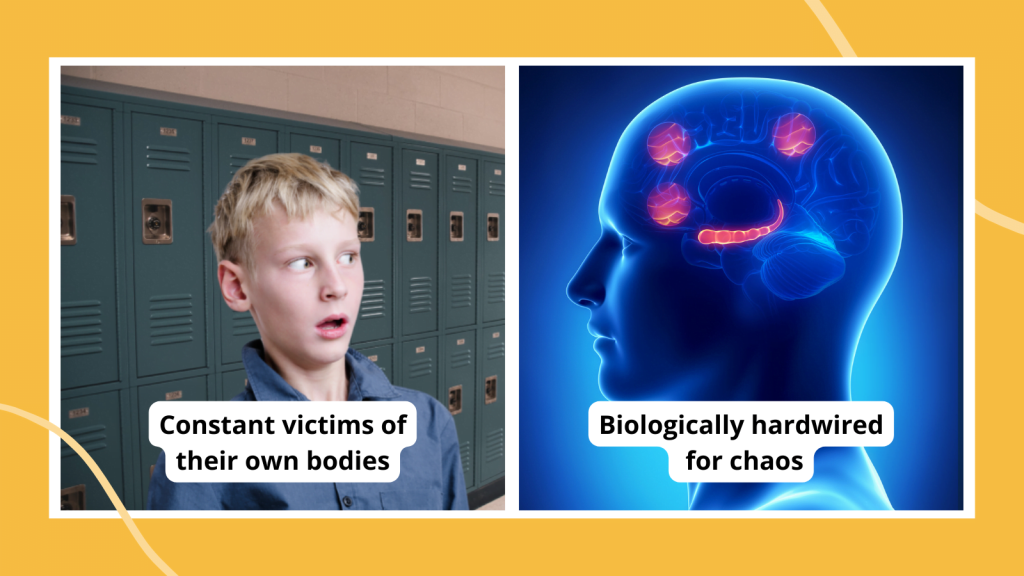
Why Teaching Middle School Is So Hard
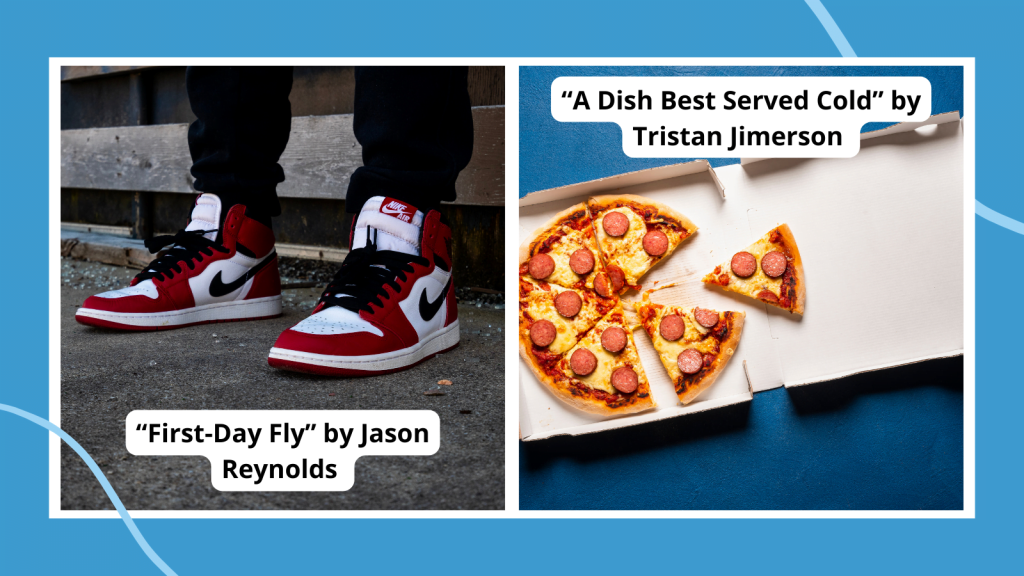
20 Best Funny Short Stories To Teach in Middle and High School
How two teachers are supporting teens’ mental health right now.
Making Sense of Fractions: This Tactic Helped Students Grasp a Key Math Topic
23 Scream-Worthy Horror Books for Teens To Read Right Now
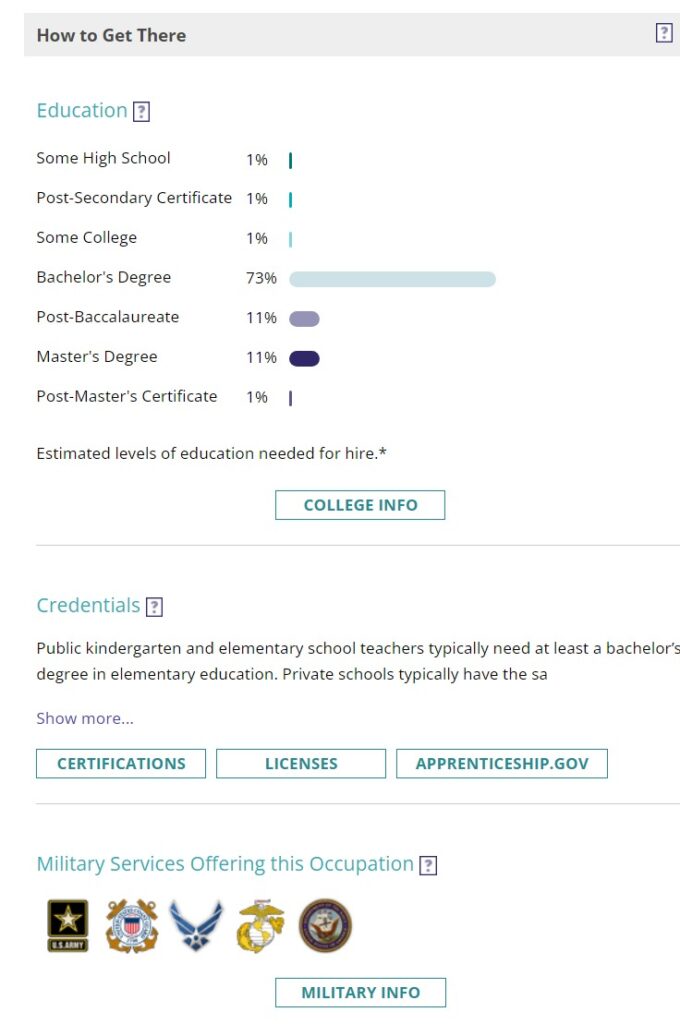
What Is Career Planning for High School Students?
Teacher pensions are failing educators most states get d and f grades, get maryland educaction network updates to your inbox.
Maryland Education Network provides information and expert opinion on current issues regarding education in our Maryland Public Schools and other education issue of a national interest.
- Privacy Policy
- Terms & Conditions
Copyright 2024 © Maryland Education Network

Narrative Writing: A Complete Guide for Teachers and Students
MASTERING THE CRAFT OF NARRATIVE WRITING
Narratives build on and encourage the development of the fundamentals of writing. They also require developing an additional skill set: the ability to tell a good yarn, and storytelling is as old as humanity.
We see and hear stories everywhere and daily, from having good gossip on the doorstep with a neighbor in the morning to the dramas that fill our screens in the evening.
Good narrative writing skills are hard-won by students even though it is an area of writing that most enjoy due to the creativity and freedom it offers.
Here we will explore some of the main elements of a good story: plot, setting, characters, conflict, climax, and resolution . And we will look too at how best we can help our students understand these elements, both in isolation and how they mesh together as a whole.

WHAT IS A NARRATIVE?

A narrative is a story that shares a sequence of events , characters, and themes. It expresses experiences, ideas, and perspectives that should aspire to engage and inspire an audience.
A narrative can spark emotion, encourage reflection, and convey meaning when done well.
Narratives are a popular genre for students and teachers as they allow the writer to share their imagination, creativity, skill, and understanding of nearly all elements of writing. We occasionally refer to a narrative as ‘creative writing’ or story writing.
The purpose of a narrative is simple, to tell the audience a story. It can be written to motivate, educate, or entertain and can be fact or fiction.
A COMPLETE UNIT ON TEACHING NARRATIVE WRITING
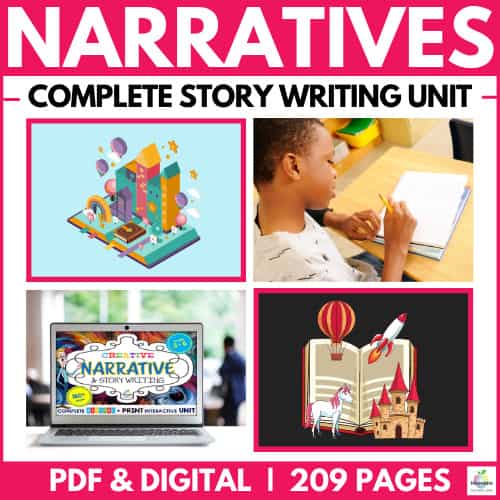
Teach your students to become skilled story writers with this HUGE NARRATIVE & CREATIVE STORY WRITING UNIT . Offering a COMPLETE SOLUTION to teaching students how to craft CREATIVE CHARACTERS, SUPERB SETTINGS, and PERFECT PLOTS .
Over 192 PAGES of materials, including:
TYPES OF NARRATIVE WRITING
There are many narrative writing genres and sub-genres such as these.
We have a complete guide to writing a personal narrative that differs from the traditional story-based narrative covered in this guide. It includes personal narrative writing prompts, resources, and examples and can be found here.

As we can see, narratives are an open-ended form of writing that allows you to showcase creativity in many directions. However, all narratives share a common set of features and structure known as “Story Elements”, which are briefly covered in this guide.
Don’t overlook the importance of understanding story elements and the value this adds to you as a writer who can dissect and create grand narratives. We also have an in-depth guide to understanding story elements here .
CHARACTERISTICS OF NARRATIVE WRITING
Narrative structure.
ORIENTATION (BEGINNING) Set the scene by introducing your characters, setting and time of the story. Establish your who, when and where in this part of your narrative
COMPLICATION AND EVENTS (MIDDLE) In this section activities and events involving your main characters are expanded upon. These events are written in a cohesive and fluent sequence.
RESOLUTION (ENDING) Your complication is resolved in this section. It does not have to be a happy outcome, however.
EXTRAS: Whilst orientation, complication and resolution are the agreed norms for a narrative, there are numerous examples of popular texts that did not explicitly follow this path exactly.
NARRATIVE FEATURES
LANGUAGE: Use descriptive and figurative language to paint images inside your audience’s minds as they read.
PERSPECTIVE Narratives can be written from any perspective but are most commonly written in first or third person.
DIALOGUE Narratives frequently switch from narrator to first-person dialogue. Always use speech marks when writing dialogue.
TENSE If you change tense, make it perfectly clear to your audience what is happening. Flashbacks might work well in your mind but make sure they translate to your audience.
THE PLOT MAP
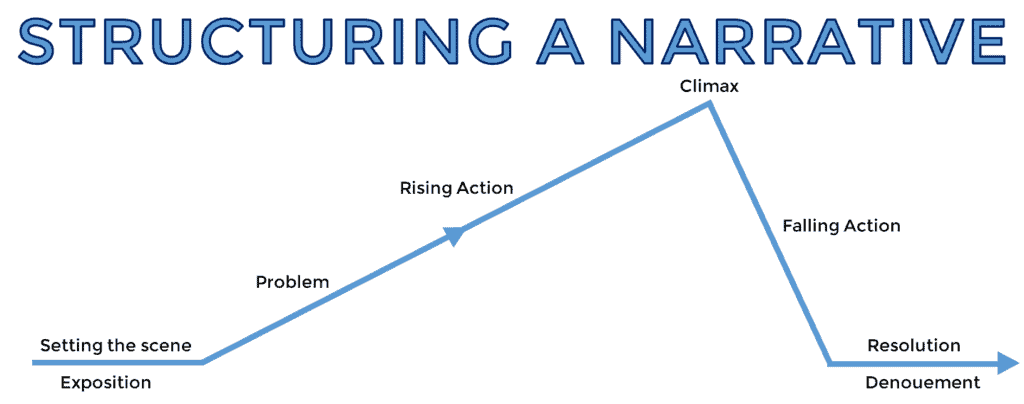
This graphic is known as a plot map, and nearly all narratives fit this structure in one way or another, whether romance novels, science fiction or otherwise.
It is a simple tool that helps you understand and organise a story’s events. Think of it as a roadmap that outlines the journey of your characters and the events that unfold. It outlines the different stops along the way, such as the introduction, rising action, climax, falling action, and resolution, that help you to see how the story builds and develops.
Using a plot map, you can see how each event fits into the larger picture and how the different parts of the story work together to create meaning. It’s a great way to visualize and analyze a story.
Be sure to refer to a plot map when planning a story, as it has all the essential elements of a great story.
THE 5 KEY STORY ELEMENTS OF A GREAT NARRATIVE (6-MINUTE TUTORIAL VIDEO)
This video we created provides an excellent overview of these elements and demonstrates them in action in stories we all know and love.
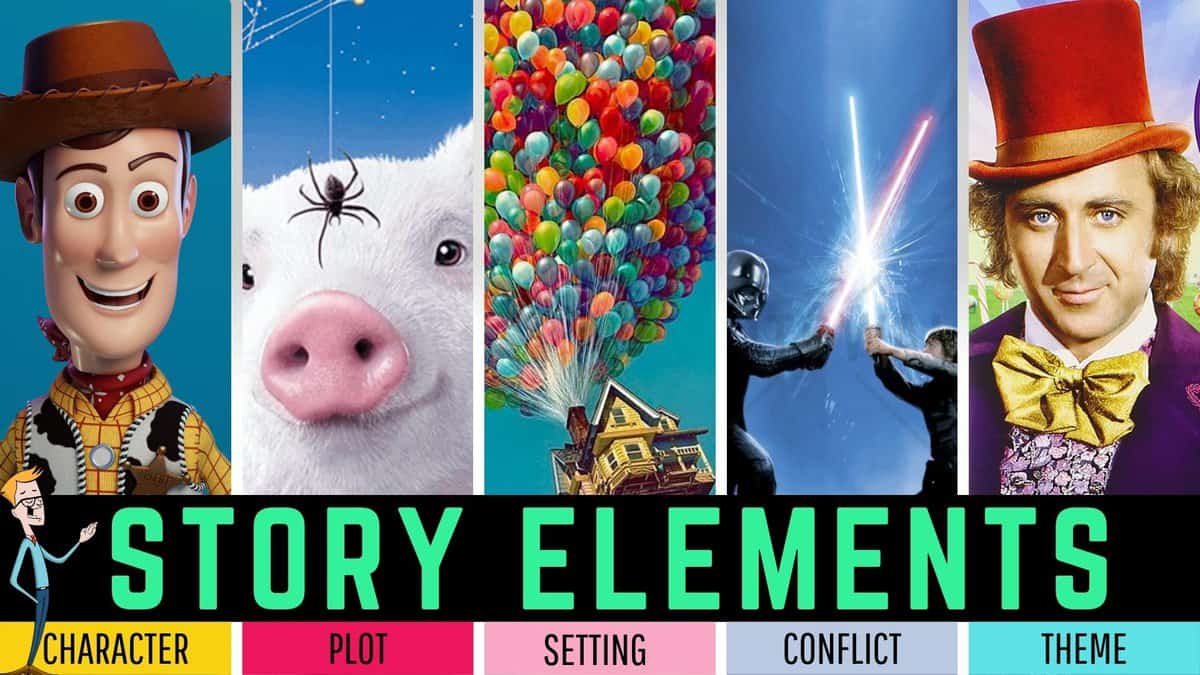
HOW TO WRITE A NARRATIVE
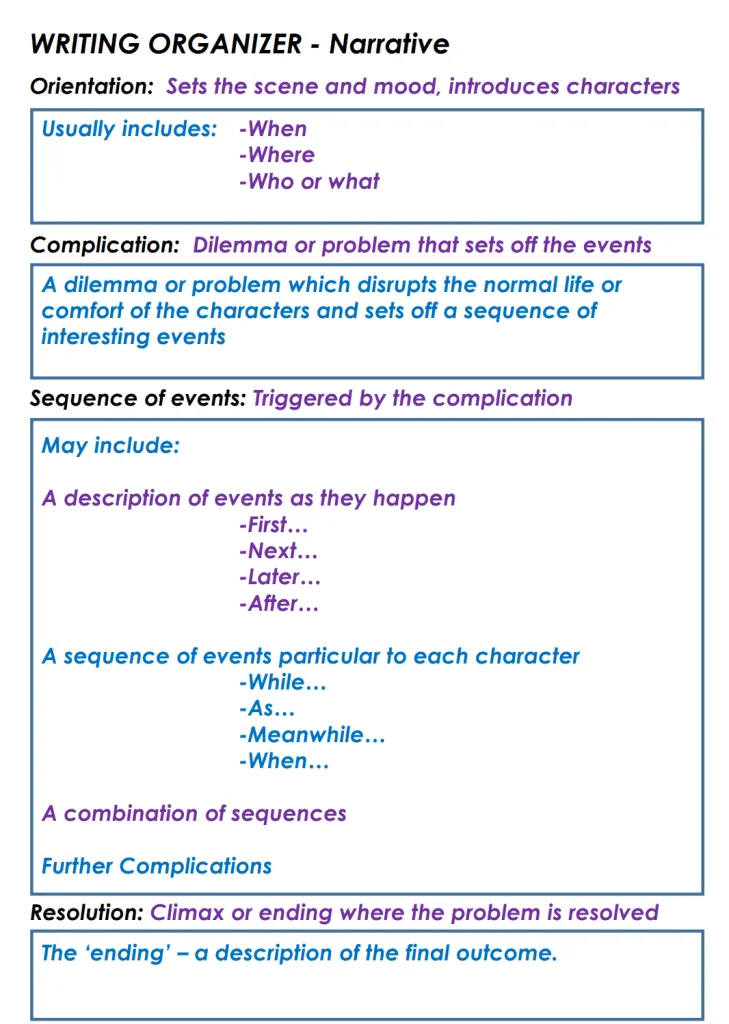
Now that we understand the story elements and how they come together to form stories, it’s time to start planning and writing your narrative.
In many cases, the template and guide below will provide enough details on how to craft a great story. However, if you still need assistance with the fundamentals of writing, such as sentence structure, paragraphs and using correct grammar, we have some excellent guides on those here.
USE YOUR WRITING TIME EFFECTIVELY: Maximize your narrative writing sessions by spending approximately 20 per cent of your time planning and preparing. This ensures greater productivity during your writing time and keeps you focused and on task.
Use tools such as graphic organizers to logically sequence your narrative if you are not a confident story writer. If you are working with reluctant writers, try using narrative writing prompts to get their creative juices flowing.
Spend most of your writing hour on the task at hand, don’t get too side-tracked editing during this time and leave some time for editing. When editing a narrative, examine it for these three elements.
- Spelling and grammar ( Is it readable?)
- Story structure and continuity ( Does it make sense, and does it flow? )
- Character and plot analysis. (Are your characters engaging? Does your problem/resolution work? )
1. SETTING THE SCENE: THE WHERE AND THE WHEN
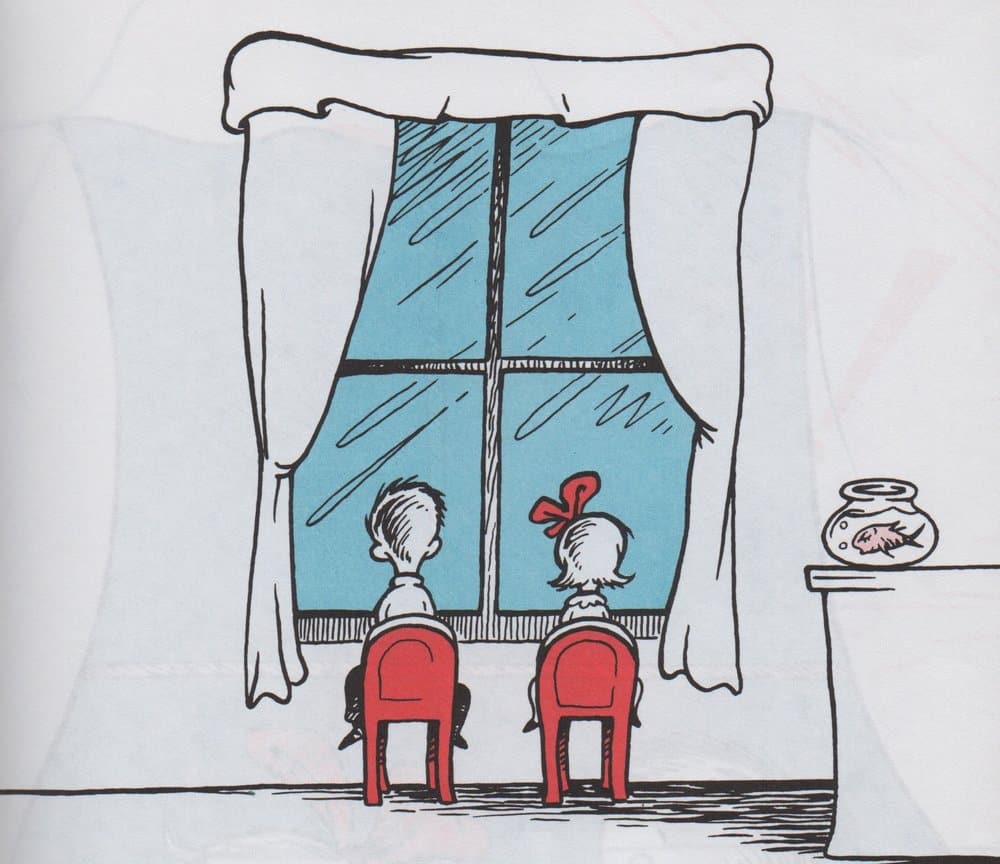
The story’s setting often answers two of the central questions in the story, namely, the where and the when. The answers to these two crucial questions will often be informed by the type of story the student is writing.
The story’s setting can be chosen to quickly orient the reader to the type of story they are reading. For example, a fictional narrative writing piece such as a horror story will often begin with a description of a haunted house on a hill or an abandoned asylum in the middle of the woods. If we start our story on a rocket ship hurtling through the cosmos on its space voyage to the Alpha Centauri star system, we can be reasonably sure that the story we are embarking on is a work of science fiction.
Such conventions are well-worn clichés true, but they can be helpful starting points for our novice novelists to make a start.
Having students choose an appropriate setting for the type of story they wish to write is an excellent exercise for our younger students. It leads naturally onto the next stage of story writing, which is creating suitable characters to populate this fictional world they have created. However, older or more advanced students may wish to play with the expectations of appropriate settings for their story. They may wish to do this for comic effect or in the interest of creating a more original story. For example, opening a story with a children’s birthday party does not usually set up the expectation of a horror story. Indeed, it may even lure the reader into a happy reverie as they remember their own happy birthday parties. This leaves them more vulnerable to the surprise element of the shocking action that lies ahead.
Once the students have chosen a setting for their story, they need to start writing. Little can be more terrifying to English students than the blank page and its bare whiteness stretching before them on the table like a merciless desert they must cross. Give them the kick-start they need by offering support through word banks or writing prompts. If the class is all writing a story based on the same theme, you may wish to compile a common word bank on the whiteboard as a prewriting activity. Write the central theme or genre in the middle of the board. Have students suggest words or phrases related to the theme and list them on the board.
You may wish to provide students with a copy of various writing prompts to get them started. While this may mean that many students’ stories will have the same beginning, they will most likely arrive at dramatically different endings via dramatically different routes.

A bargain is at the centre of the relationship between the writer and the reader. That bargain is that the reader promises to suspend their disbelief as long as the writer creates a consistent and convincing fictional reality. Creating a believable world for the fictional characters to inhabit requires the student to draw on convincing details. The best way of doing this is through writing that appeals to the senses. Have your student reflect deeply on the world that they are creating. What does it look like? Sound like? What does the food taste like there? How does it feel like to walk those imaginary streets, and what aromas beguile the nose as the main character winds their way through that conjured market?
Also, Consider the when; or the time period. Is it a future world where things are cleaner and more antiseptic? Or is it an overcrowded 16th-century London with human waste stinking up the streets? If students can create a multi-sensory installation in the reader’s mind, then they have done this part of their job well.
Popular Settings from Children’s Literature and Storytelling
- Fairytale Kingdom
- Magical Forest
- Village/town
- Underwater world
- Space/Alien planet
2. CASTING THE CHARACTERS: THE WHO
Now that your student has created a believable world, it is time to populate it with believable characters.
In short stories, these worlds mustn’t be overpopulated beyond what the student’s skill level can manage. Short stories usually only require one main character and a few secondary ones. Think of the short story more as a small-scale dramatic production in an intimate local theater than a Hollywood blockbuster on a grand scale. Too many characters will only confuse and become unwieldy with a canvas this size. Keep it simple!
Creating believable characters is often one of the most challenging aspects of narrative writing for students. Fortunately, we can do a few things to help students here. Sometimes it is helpful for students to model their characters on actual people they know. This can make things a little less daunting and taxing on the imagination. However, whether or not this is the case, writing brief background bios or descriptions of characters’ physical personality characteristics can be a beneficial prewriting activity. Students should give some in-depth consideration to the details of who their character is: How do they walk? What do they look like? Do they have any distinguishing features? A crooked nose? A limp? Bad breath? Small details such as these bring life and, therefore, believability to characters. Students can even cut pictures from magazines to put a face to their character and allow their imaginations to fill in the rest of the details.
Younger students will often dictate to the reader the nature of their characters. To improve their writing craft, students must know when to switch from story-telling mode to story-showing mode. This is particularly true when it comes to character. Encourage students to reveal their character’s personality through what they do rather than merely by lecturing the reader on the faults and virtues of the character’s personality. It might be a small relayed detail in the way they walk that reveals a core characteristic. For example, a character who walks with their head hanging low and shoulders hunched while avoiding eye contact has been revealed to be timid without the word once being mentioned. This is a much more artistic and well-crafted way of doing things and is less irritating for the reader. A character who sits down at the family dinner table immediately snatches up his fork and starts stuffing roast potatoes into his mouth before anyone else has even managed to sit down has revealed a tendency towards greed or gluttony.
Understanding Character Traits
Again, there is room here for some fun and profitable prewriting activities. Give students a list of character traits and have them describe a character doing something that reveals that trait without ever employing the word itself.
It is also essential to avoid adjective stuffing here. When looking at students’ early drafts, adjective stuffing is often apparent. To train the student out of this habit, choose an adjective and have the student rewrite the sentence to express this adjective through action rather than telling.
When writing a story, it is vital to consider the character’s traits and how they will impact the story’s events. For example, a character with a strong trait of determination may be more likely to overcome obstacles and persevere. In contrast, a character with a tendency towards laziness may struggle to achieve their goals. In short, character traits add realism, depth, and meaning to a story, making it more engaging and memorable for the reader.
Popular Character Traits in Children’s Stories
- Determination
- Imagination
- Perseverance
- Responsibility
We have an in-depth guide to creating great characters here , but most students should be fine to move on to planning their conflict and resolution.
3. NO PROBLEM? NO STORY! HOW CONFLICT DRIVES A NARRATIVE

This is often the area apprentice writers have the most difficulty with. Students must understand that without a problem or conflict, there is no story. The problem is the driving force of the action. Usually, in a short story, the problem will center around what the primary character wants to happen or, indeed, wants not to happen. It is the hurdle that must be overcome. It is in the struggle to overcome this hurdle that events happen.
Often when a student understands the need for a problem in a story, their completed work will still not be successful. This is because, often in life, problems remain unsolved. Hurdles are not always successfully overcome. Students pick up on this.
We often discuss problems with friends that will never be satisfactorily resolved one way or the other, and we accept this as a part of life. This is not usually the case with writing a story. Whether a character successfully overcomes his or her problem or is decidedly crushed in the process of trying is not as important as the fact that it will finally be resolved one way or the other.
A good practical exercise for students to get to grips with this is to provide copies of stories and have them identify the central problem or conflict in each through discussion. Familiar fables or fairy tales such as Three Little Pigs, The Boy Who Cried Wolf, Cinderella, etc., are great for this.
While it is true that stories often have more than one problem or that the hero or heroine is unsuccessful in their first attempt to solve a central problem, for beginning students and intermediate students, it is best to focus on a single problem, especially given the scope of story writing at this level. Over time students will develop their abilities to handle more complex plots and write accordingly.
Popular Conflicts found in Children’s Storytelling.
- Good vs evil
- Individual vs society
- Nature vs nurture
- Self vs others
- Man vs self
- Man vs nature
- Man vs technology
- Individual vs fate
- Self vs destiny
Conflict is the heart and soul of any good story. It’s what makes a story compelling and drives the plot forward. Without conflict, there is no story. Every great story has a struggle or a problem that needs to be solved, and that’s where conflict comes in. Conflict is what makes a story exciting and keeps the reader engaged. It creates tension and suspense and makes the reader care about the outcome.
Like in real life, conflict in a story is an opportunity for a character’s growth and transformation. It’s a chance for them to learn and evolve, making a story great. So next time stories are written in the classroom, remember that conflict is an essential ingredient, and without it, your story will lack the energy, excitement, and meaning that makes it truly memorable.
4. THE NARRATIVE CLIMAX: HOW THINGS COME TO A HEAD!

The climax of the story is the dramatic high point of the action. It is also when the struggles kicked off by the problem come to a head. The climax will ultimately decide whether the story will have a happy or tragic ending. In the climax, two opposing forces duke things out until the bitter (or sweet!) end. One force ultimately emerges triumphant. As the action builds throughout the story, suspense increases as the reader wonders which of these forces will win out. The climax is the release of this suspense.
Much of the success of the climax depends on how well the other elements of the story have been achieved. If the student has created a well-drawn and believable character that the reader can identify with and feel for, then the climax will be more powerful.
The nature of the problem is also essential as it determines what’s at stake in the climax. The problem must matter dearly to the main character if it matters at all to the reader.
Have students engage in discussions about their favorite movies and books. Have them think about the storyline and decide the most exciting parts. What was at stake at these moments? What happened in your body as you read or watched? Did you breathe faster? Or grip the cushion hard? Did your heart rate increase, or did you start to sweat? This is what a good climax does and what our students should strive to do in their stories.
The climax puts it all on the line and rolls the dice. Let the chips fall where the writer may…
Popular Climax themes in Children’s Stories
- A battle between good and evil
- The character’s bravery saves the day
- Character faces their fears and overcomes them
- The character solves a mystery or puzzle.
- The character stands up for what is right.
- Character reaches their goal or dream.
- The character learns a valuable lesson.
- The character makes a selfless sacrifice.
- The character makes a difficult decision.
- The character reunites with loved ones or finds true friendship.
5. RESOLUTION: TYING UP LOOSE ENDS
After the climactic action, a few questions will often remain unresolved for the reader, even if all the conflict has been resolved. The resolution is where those lingering questions will be answered. The resolution in a short story may only be a brief paragraph or two. But, in most cases, it will still be necessary to include an ending immediately after the climax can feel too abrupt and leave the reader feeling unfulfilled.
An easy way to explain resolution to students struggling to grasp the concept is to point to the traditional resolution of fairy tales, the “And they all lived happily ever after” ending. This weather forecast for the future allows the reader to take their leave. Have the student consider the emotions they want to leave the reader with when crafting their resolution.
While the action is usually complete by the end of the climax, it is in the resolution that if there is a twist to be found, it will appear – think of movies such as The Usual Suspects. Pulling this off convincingly usually requires considerable skill from a student writer. Still, it may well form a challenging extension exercise for those more gifted storytellers among your students.
Popular Resolutions in Children’s Stories
- Our hero achieves their goal
- The character learns a valuable lesson
- A character finds happiness or inner peace.
- The character reunites with loved ones.
- Character restores balance to the world.
- The character discovers their true identity.
- Character changes for the better.
- The character gains wisdom or understanding.
- Character makes amends with others.
- The character learns to appreciate what they have.
Once students have completed their story, they can edit for grammar, vocabulary choice, spelling, etc., but not before!
As mentioned, there is a craft to storytelling, as well as an art. When accurate grammar, perfect spelling, and immaculate sentence structures are pushed at the outset, they can cause storytelling paralysis. For this reason, it is essential that when we encourage the students to write a story, we give them license to make mechanical mistakes in their use of language that they can work on and fix later.
Good narrative writing is a very complex skill to develop and will take the student years to become competent. It challenges not only the student’s technical abilities with language but also her creative faculties. Writing frames, word banks, mind maps, and visual prompts can all give valuable support as students develop the wide-ranging and challenging skills required to produce a successful narrative writing piece. But, at the end of it all, as with any craft, practice and more practice is at the heart of the matter.
TIPS FOR WRITING A GREAT NARRATIVE
- Start your story with a clear purpose: If you can determine the theme or message you want to convey in your narrative before starting it will make the writing process so much simpler.
- Choose a compelling storyline and sell it through great characters, setting and plot: Consider a unique or interesting story that captures the reader’s attention, then build the world and characters around it.
- Develop vivid characters that are not all the same: Make your characters relatable and memorable by giving them distinct personalities and traits you can draw upon in the plot.
- Use descriptive language to hook your audience into your story: Use sensory language to paint vivid images and sequences in the reader’s mind.
- Show, don’t tell your audience: Use actions, thoughts, and dialogue to reveal character motivations and emotions through storytelling.
- Create a vivid setting that is clear to your audience before getting too far into the plot: Describe the time and place of your story to immerse the reader fully.
- Build tension: Refer to the story map earlier in this article and use conflict, obstacles, and suspense to keep the audience engaged and invested in your narrative.
- Use figurative language such as metaphors, similes, and other literary devices to add depth and meaning to your narrative.
- Edit, revise, and refine: Take the time to refine and polish your writing for clarity and impact.
- Stay true to your voice: Maintain your unique perspective and style in your writing to make it your own.
NARRATIVE WRITING EXAMPLES (Student Writing Samples)
Below are a collection of student writing samples of narratives. Click on the image to enlarge and explore them in greater detail. Please take a moment to read these creative stories in detail and the teacher and student guides which highlight some of the critical elements of narratives to consider before writing.
Please understand these student writing samples are not intended to be perfect examples for each age or grade level but a piece of writing for students and teachers to explore together to critically analyze to improve student writing skills and deepen their understanding of story writing.
We recommend reading the example either a year above or below, as well as the grade you are currently working with, to gain a broader appreciation of this text type.
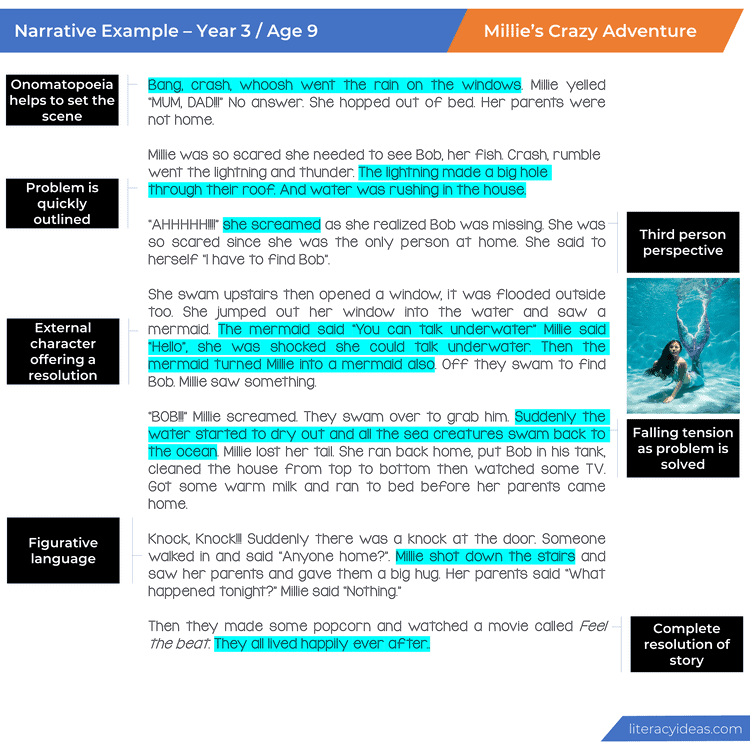
NARRATIVE WRITING PROMPTS (Journal Prompts)
When students have a great journal prompt, it can help them focus on the task at hand, so be sure to view our vast collection of visual writing prompts for various text types here or use some of these.
- On a recent European trip, you find your travel group booked into the stunning and mysterious Castle Frankenfurter for a single night… As night falls, the massive castle of over one hundred rooms seems to creak and groan as a series of unexplained events begin to make you wonder who or what else is spending the evening with you. Write a narrative that tells the story of your evening.
- You are a famous adventurer who has discovered new lands; keep a travel log over a period of time in which you encounter new and exciting adventures and challenges to overcome. Ensure your travel journal tells a story and has a definite introduction, conflict and resolution.
- You create an incredible piece of technology that has the capacity to change the world. As you sit back and marvel at your innovation and the endless possibilities ahead of you, it becomes apparent there are a few problems you didn’t really consider. You might not even be able to control them. Write a narrative in which you ride the highs and lows of your world-changing creation with a clear introduction, conflict and resolution.
- As the final door shuts on the Megamall, you realise you have done it… You and your best friend have managed to sneak into the largest shopping centre in town and have the entire place to yourselves until 7 am tomorrow. There is literally everything and anything a child would dream of entertaining themselves for the next 12 hours. What amazing adventures await you? What might go wrong? And how will you get out of there scot-free?
- A stranger walks into town… Whilst appearing similar to almost all those around you, you get a sense that this person is from another time, space or dimension… Are they friends or foes? What makes you sense something very strange is going on? Suddenly they stand up and walk toward you with purpose extending their hand… It’s almost as if they were reading your mind.
NARRATIVE WRITING VIDEO TUTORIAL

Teaching Resources
Use our resources and tools to improve your student’s writing skills through proven teaching strategies.
When teaching narrative writing, it is essential that you have a range of tools, strategies and resources at your disposal to ensure you get the most out of your writing time. You can find some examples below, which are free and paid premium resources you can use instantly without any preparation.
FREE Narrative Graphic Organizer
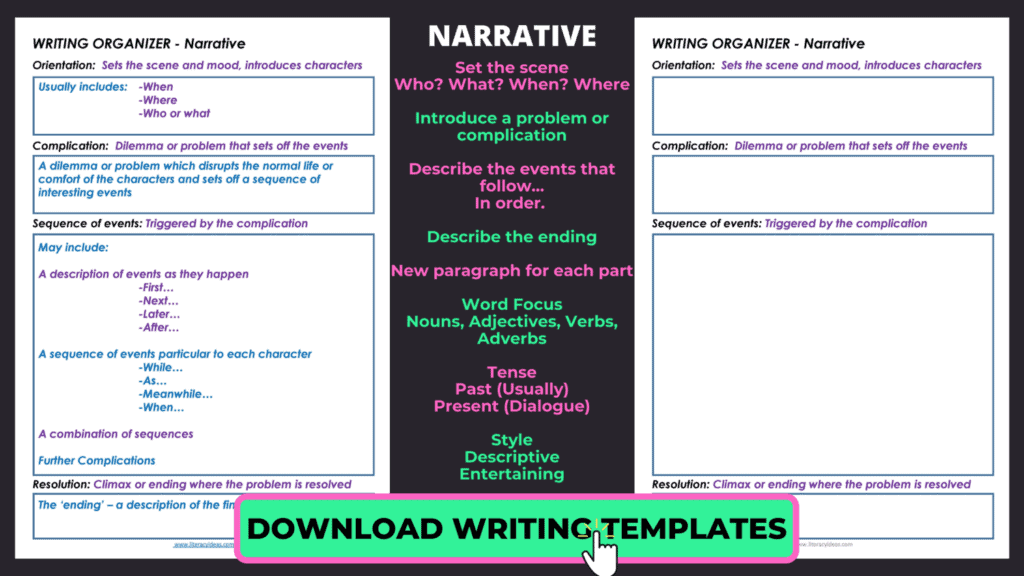
THE STORY TELLERS BUNDLE OF TEACHING RESOURCES
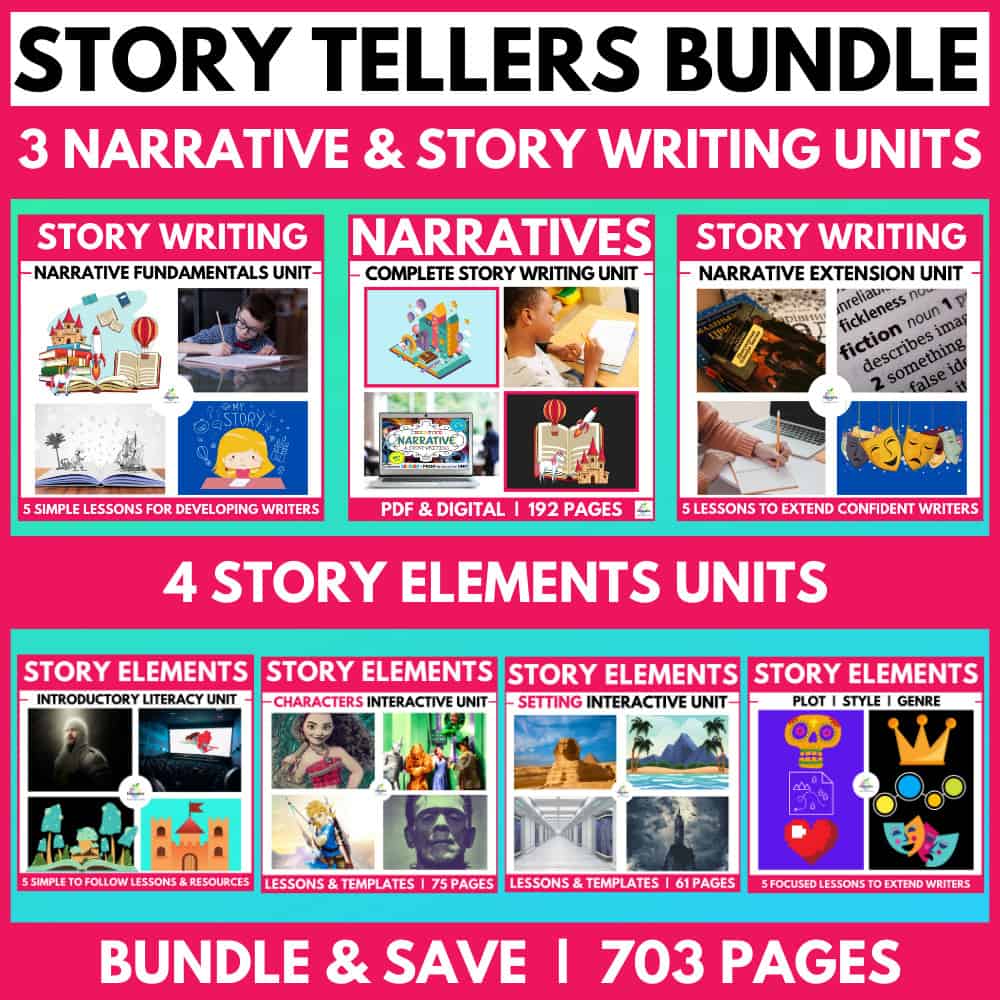
A MASSIVE COLLECTION of resources for narratives and story writing in the classroom covering all elements of crafting amazing stories. MONTHS WORTH OF WRITING LESSONS AND RESOURCES, including:
NARRATIVE WRITING CHECKLIST BUNDLE

⭐⭐⭐⭐⭐ (92 Reviews)
OTHER GREAT ARTICLES ABOUT NARRATIVE WRITING
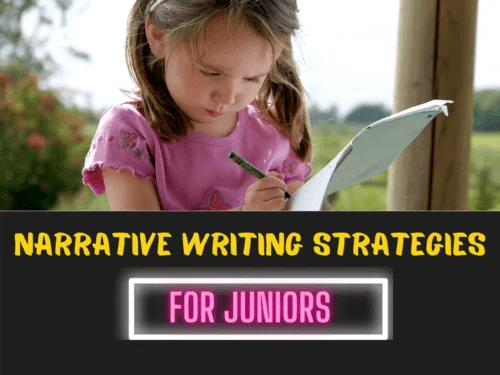
Narrative Writing for Kids: Essential Skills and Strategies

7 Great Narrative Lesson Plans Students and Teachers Love
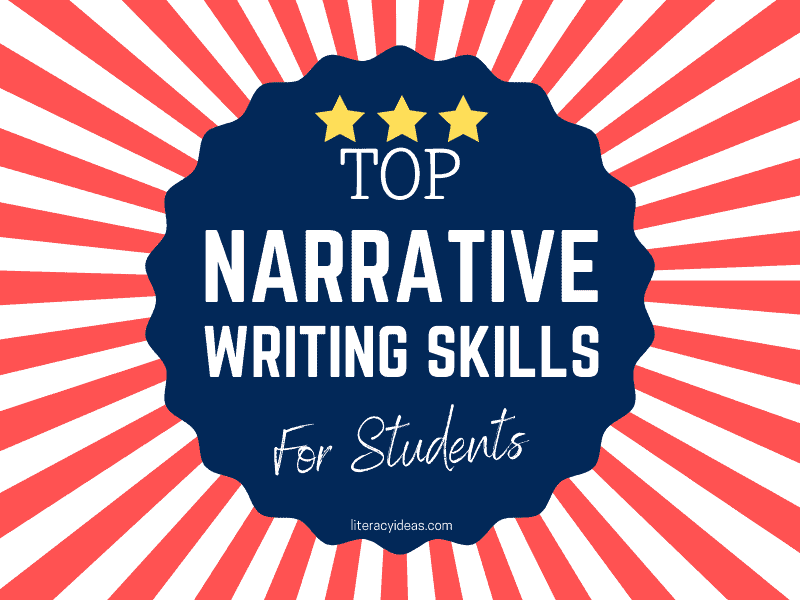
Top 7 Narrative Writing Exercises for Students
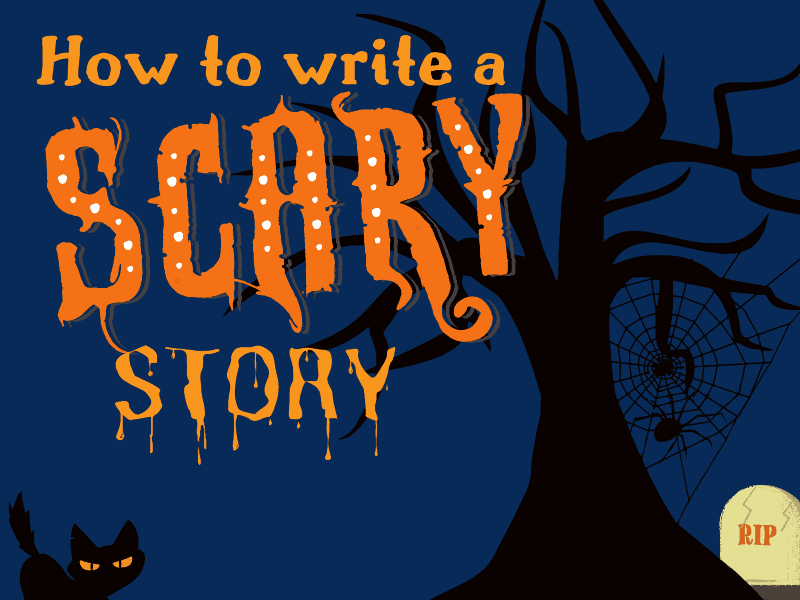
How to Write a Scary Story

- school Campus Bookshelves
- menu_book Bookshelves
- perm_media Learning Objects
- login Login
- how_to_reg Request Instructor Account
- hub Instructor Commons
- Download Page (PDF)
- Download Full Book (PDF)
- Periodic Table
- Physics Constants
- Scientific Calculator
- Reference & Cite
- Tools expand_more
- Readability
selected template will load here
This action is not available.

15.2: Narrative Essay
- Last updated
- Save as PDF
- Page ID 4332

Learning Objectives
- Read an example of the narrative rhetorical mode.
My College Education
The first class I went to in college was philosophy, and it changed my life forever. Our first assignment was to write a short response paper to the Albert Camus essay “The Myth of Sisyphus.” I was extremely nervous about the assignment as well as college. However, through all the confusion in philosophy class, many of my questions about life were answered.
I entered college intending to earn a degree in engineering. I always liked the way mathematics had right and wrong answers. I understood the logic and was very good at it. So when I received my first philosophy assignment that asked me to write my interpretation of the Camus essay, I was instantly confused. What is the right way to do this assignment, I wondered? I was nervous about writing an incorrect interpretation and did not want to get my first assignment wrong. Even more troubling was that the professor refused to give us any guidelines on what he was looking for; he gave us total freedom. He simply said, “I want to see what you come up with.”
Full of anxiety, I first set out to read Camus’s essay several times to make sure I really knew what was it was about. I did my best to take careful notes. Yet even after I took all these notes and knew the essay inside and out, I still did not know the right answer. What was my interpretation? I could think of a million different ways to interpret the essay, but which one was my professor looking for? In math class, I was used to examples and explanations of solutions. This assignment gave me nothing; I was completely on my own to come up with my individual interpretation.
Next, when I sat down to write, the words just did not come to me. My notes and ideas were all present, but the words were lost. I decided to try every prewriting strategy I could find. I brainstormed, made idea maps, and even wrote an outline. Eventually, after a lot of stress, my ideas became more organized and the words fell on the page. I had my interpretation of “The Myth of Sisyphus,” and I had my main reasons for interpreting the essay. I remember being unsure of myself, wondering if what I was saying made sense, or if I was even on the right track. Through all the uncertainty, I continued writing the best I could. I finished the conclusion paragraph, had my spouse proofread it for errors, and turned it in the next day simply hoping for the best.
Then, a week or two later, came judgment day. The professor gave our papers back to us with grades and comments. I remember feeling simultaneously afraid and eager to get the paper back in my hands. It turned out, however, that I had nothing to worry about. The professor gave me an A on the paper, and his notes suggested that I wrote an effective essay overall. He wrote that my reading of the essay was very original and that my thoughts were well organized. My relief and newfound confidence upon reading his comments could not be overstated.
What I learned through this process extended well beyond how to write a college paper. I learned to be open to new challenges. I never expected to enjoy a philosophy class and always expected to be a math and science person. This class and assignment, however, gave me the self-confidence, critical-thinking skills, and courage to try a new career path. I left engineering and went on to study law and eventually became a lawyer. More important, that class and paper helped me understand education differently. Instead of seeing college as a direct stepping stone to a career, I learned to see college as a place to first learn and then seek a career or enhance an existing career. By giving me the space to express my own interpretation and to argue for my own values, my philosophy class taught me the importance of education for education’s sake. That realization continues to pay dividends every day.
Online Narrative Essay Alternatives
Sandra Cisneros offers an example of a narrative essay in Only Daughter that captures her sense of her Chicana-Mexican heritage as the only daughter in a family of seven children.
Her complete essay is available on several websites, including the following:
- http://distelrath.wikispaces.com/fil...y+Daughter.doc
- www.cabrillo.edu/academics/en.../100resources/’Only%20Daughter’.pdf
- www.tbaisd.k12.mi.us/departme...y_Daughter.pdf
Gary Shteyngart came to the United States when he was seven years old. The son of Russian Jewish parents who struggled to provide a better life for their son, he reflects on his struggles, including becoming “American,” in Sixty-Nine Cents :
- http://www.newyorker.com/reporting/2...#ixzz0pihck7DS
- http://www.america.gov/st/peopleplac...0.8106806.html
Sherman Alexie grew up on the Spokane Reservation in Washington State. He chronicles his challenges in school, starting in first grade, in Indian Education :
- comosr.spps.org/Alexie.html
- www.forsyth.k12.ga.us/1323207...ation_TEXT.rtf
- www.pfeonyx.com/alliance/Indi...on/Alexie2.pdf
- Share full article
Advertisement
Supported by
Picture Prompts
125 Picture Prompts for Creative and Narrative Writing
What story can these images tell?

By The Learning Network
For eight years, we at The Learning Network have been publishing short, accessible, image-driven prompts that invite students to do a variety of kinds of writing via our Picture Prompts column.
Each week, at least one of those prompts asks students: Use your imagination to write the opening of a short story or poem inspired by this image — or, tell us about a memory from your own life that it makes you think of.
Now we’re rounding up years of these storytelling prompts all in one place. Below you’ll find 125 photos, illustrations and GIFs from across The New York Times that you can use for both creative and personal writing. We have organized them by genre, but many overlap and intersect, so know that you can use them in any way you like.
Choose an image, write a story, and then follow the link in the caption to the original prompt to post your response or read what other students had to say. Many are still open for comment for teenagers 13 and up. And each links to a free Times article too.
We can’t wait to read the tales you spin! Don’t forget that you can respond to all of our Picture Prompts, as they publish, here .
Images by Category
Everyday life, mystery & suspense, relationships, science fiction, travel & adventure, unusual & unexpected, cat in a chair, happy puppy, resourceful raccoon, cows and cellos, people and penguins, opossum among shoes, on the subway, sunset by the water, endless conversation, falling into a hole, lounging around, sneaker collection, the concert, meadow in starlight.

Related Picture Prompt | Related Article
Public Selfies
Night circus, tarot cards, castle on a hill, security line, batman on a couch, reaching through the wall, beware of zombies, haunted house, familial frights, witches on the water, blindfolded, phone booth in the wilderness, shadow in the sky, a letter in the mail, hidden doorway.

Point of No Return
Darkened library, under the table, playing dominoes, looking back, a wave goodbye, out at dusk, conversation, walking away, alone and together, a new friend, heated conversation, up in a tree, hole in the ceiling, under the desk, at their computers, marching band, band practice, in the hallway, in the lunchroom, the red planet, tech gadgets, trapped inside, astronaut and spider, computer screen, special key, tethered in space, on the court, in the waves, city skateboarding.

Fishing in a Stream
Over the falls.

Under the Sea
Sledding in the mountains, cracked mirror, wilderness wayfaring, car and cactus, walking through town, tropical confinement, travel travails, roller coasters, atop the hill, climbing a ladder, under the ice, other selves.
Students 13 and older in the United States and Britain, and 16 and older elsewhere, are invited to comment. All comments are moderated by the Learning Network staff, but please keep in mind that once your comment is accepted, it will be made public and may appear in print.
Find more Picture Prompts here.
Jump to navigation
- Inside Writing
- Teacher's Guides
Student Models
- Writing Topics
- Minilessons
- Shopping Cart
- Inside Grammar
- Grammar Adventures
- CCSS Correlations
- Infographics
Student Writing Models
How do I use student models in my classroom?
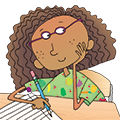
When you need an example written by a student, check out our vast collection of free student models. Scroll through the list, or search for a mode of writing such as “explanatory” or “persuasive.”
Jump to . . .
Explanatory writing.
- How Much I Know About Space Explanatory Paragraph
- My Favorite Pet Explanatory Paragraph
- Sweet Spring Explanatory Paragraph
Narrative Writing
- A Happy Day Narrative Paragraph
- My Trip to Mexico Narrative Paragraph
Creative Writing
- Happy Easter Story Paragraph
- Leaf Person Story
Research Writing
- Parrots Report
- If I Were President Explanatory Paragraph
- My Dad Personal Narrative
- The Horrible Day Personal Narrative
Response to Literature
- One Great Book Book Review
- A Fable Story
- Ant Poem Poem
- The Missing Coin Story
- Winter Words Poem
- Horses Report
- Ladybugs Report
- How to Make Boiled Eggs How-To
Persuasive Writing
- Plastic, Paper, or Cloth? Persuasive Paragraph
- The Funny Dance Personal Narrative
- The Sled Run Personal Narrative
- Hello, Spring! Poem
- Cheetahs Report
Business Writing
- Dear Ms. Nathan Email
- My Favorite Place to Go Description
- My Mother Personal Essay
- Rules Personal Essay
- Shadow Fort Description
- Adopting a Pet from the Pound Editorial
- Letter to the Editor Letter to the Editor
- Ann Personal Narrative
- Grandpa, Chaz, and Me Personal Narrative
- Indy’s Life Story Personal Narrative
- Jet Bikes Personal Narrative
- The Day I Took the Spotlight Personal Narrative
- A Story of Survival Book Review
- Chloe’s Day Story
- Did You Ever Look At . . . Poem
- Dreams Poem
- I Am Attean Poem
- Sloppy Joes Poem
- The Civil War Poem
- The Haunted House Story
- The Terror of Kansas Story
- When I Was Upside Down Poem
- Deer Don’t Need to Flee to Stay Trouble-Free! Report
- Height-Challenged German Shepherd Report
- Friendship Definition
- What Really Matters News Feature
- Cheating in America Problem-Solution
- Hang Up and Drive Editorial
- Musical Arts Editorial
- Summer: 15 Days or 2 1/2 Months? Editorial
- A Cowboy's Journal Fictionalized Journal Entry
- Giving Life Personal Narrative
- The Great Paw Paw Personal Narrative
- The Racist Warehouse Personal Narrative
- Limadastrin Poem
- The Best Little Girl in the World Book Review
- How the Stars Came to Be Story
- Linden’s Library Story
- My Backyard Poem
- The Call Poem
- I Am Latvia Research Report
- Mir Pushed the Frontier of Space Research Report
- The Aloha State Research Report
- The Incredible Egg Observation Report
- Unique Wolves Research Report
- Dear Dr. Larson Email
Personal Writing
- A Lesson to Learn Journal
- Caught in the Net Definition
- From Bed Bound to Breaking Boards News Feature
- If Only They Knew Comparison-Contrast
- Save the Elephants Cause-Effect
- Student Entrepreneur Reaches for Dreams of the Sky News Feature
- Internet Plagiarism Problem-Solution
- Mosquito Madness Pet Peeve
- Anticipating the Dream Personal Narrative
- Huddling Together Personal Narrative
- H’s Hickory Chips Personal Narrative
- It’s a Boy! Personal Narrative
- My Greatest Instrument Personal Narrative
- Snapshots Personal Narrative
- Take Me to Casablanca Personal Narrative
- The Boy with Chris Pine Blue Eyes Personal Narrative
- The Climb Personal Narrative
- The House on Medford Avenue Personal Narrative
- Adam’s Train of Ghosts Music Review
- Diary of Gaspard Fictionalized Journal Entry
- My Interpretation of The Joy Luck Club Literary Analysis
- Mama’s Stitches Poem
- The KHS Press Play
- Rosa Parks Research Report
- The Killer Bean Research Report
- Mid-Project Report on History Paper Email
- Vegetarian Lunch Options at Bay High Email

IMAGES
VIDEO
COMMENTS
We've got 50 narrative essay topics designed to prompt students to craft memorable written narratives. These can be modified for students in elementary, middle and high school. Feel free to print the entire narrative essay topics list for plenty of inspiration for your next narrative essay assignment! Narrative Essay Topics. Your first day of ...
The list of 100 narrative essay topics that we've compiled is a versatile and expansive set designed to inspire students at various educational levels. The topics range from lighter, more relatable experiences like your "first job interview" or "a memorable birthday party," to deeper, more introspective themes such as "an experience ...
Here is a PDF of all 650 prompts, and we also have a related lesson plan, From 'Lives' to 'Modern Love': Writing Personal Essays With Help From The New York Times.. Below, a list that ...
Writing Topics. Do you want to inspire your students to write great narratives, essays, and reports? Check out these grade-specific writing topics organized by mode (explanatory, creative, and so on). Or search for writing topics that relate to a theme, such as "life" or "animals" or "family.".
A good narrative essay will begin with an attention-grabbing opening line. But make sure to avoid common clichés, such as "It was the best of times, it was the worst of times.". Instead, come up with something original and specific to you and your situation. For example: "My pre-calc teacher was obsessed with circles.
A narrative essay is a prose-written story that's focused on the commentary of a central theme. Narrative essays are generally written in the first-person POV, and are usually about a topic that's personal to the writer. Everything in a narrative essay should take place in an established timeline, with a clear beginning, middle, and end.
Update, Sept. 9, 2022: We published a new collection of 445 narrative and personal writing prompts. We've been posting fresh writing prompts every school day for over a decade now, and every so ...
The essay should demonstrate a mature perspective through analysis, synthesis, and so on. Aim for a universal appeal. Alice Walker once described a personal essay as "a personal account that is yet shared, in its theme and its meaning, by all of us." Consider these selecting activities to help students identify a topic for their essay:
150 Unique Topics for Narrative Essay. It can be quite tough to think of something meaningful to write your essay about, but almost any experience you have can be an interesting topic. For one person, the first time they played a sport could be a traumatic experience, for another it could be life-changing.
Topics for narrative essays can range from the important to the trivial. Usually the point is not so much the story itself, but the way you tell it. A narrative essay is a way of testing your ability to tell a story in a clear and interesting way. You're expected to think about where your story begins and ends, and how to convey it with eye ...
Start-Up Activity Draw a clock face on the whiteboard. Next to the clock list prewriting, writing, revising, and editing. Then discuss with students how much time they should allot for each step in the writing process during a timed writing. (For example, if they have 45 minutes, they should allot 5 minutes for prewriting, 30-35 minutes for writing, and 5-10 minutes for revising and editing.)
Focus on a specific event or detail to make your narrative more focused and impactful. Look for universal themes like love or personal transformation that connect with readers on a deeper level. Brainstorm ideas and write freely to uncover compelling topics. Decide on storytelling techniques like flashbacks or foreshadowing and choose a topic ...
A narrative essay, on the other hand, is a story that is told in order to explore an idea. And in that regard, its thematic significance is crucial. Now see these… 12 Narrative Essay Topics for Students. Use these engaging narrative essay prompts to help students find creative, meaningful moments from their lives to share!
A personal narrative outline is one of the best ways to start brainstorming ideas for the final piece. After the students have created an outline, they can write the first draft of their personal narrative. At that point, the teacher can review the draft, or the students can participate in a peer-review process.
Moreover, in choosing to write about yourself or about someone else, you decide the organization of your paper. This page titled 2.1: Introduction is shared under a CK-12 license and was authored, remixed, and/or curated by CK-12 Foundation via source content that was edited to the style and standards of the LibreTexts platform; a detailed edit ...
Narrative and Personal Essay Topics for High School. Think of a narrative essay like telling a story. Use some of the same techniques that you would for a descriptive essay, but be sure you have a beginning, middle, and end. A narrative essay doesn't necessarily need to be personal, but they often are. Take inspiration from these narrative ...
Writing Guidelines: Personal Narrative. Review the guidelines for writing personal narratives on the next two pages. Page 122 focuses on identifying suitable topics and gathering information about them. For possible topics, students should refer to their journals, to their life map (page 25), and to the topics and prompts listed on pages 28 and ...
A narrative can spark emotion, encourage reflection, and convey meaning when done well. Narratives are a popular genre for students and teachers as they allow the writer to share their imagination, creativity, skill, and understanding of nearly all elements of writing. We occasionally refer to a narrative as 'creative writing' or story writing.
Gary Shteyngart came to the United States when he was seven years old. The son of Russian Jewish parents who struggled to provide a better life for their son, he reflects on his struggles, including becoming "American," in Sixty-Nine Cents: Sherman Alexie grew up on the Spokane Reservation in Washington State.
Writing a Narrative Paragraph Once you finish prewriting, you are ready to write your paragraph. These writing activities will help you create a topic sentence, body sentences, and an ending sentence. You'll also read another student's paragraph to see how all of the parts came together. Writing the Topic Sentence Your narrative paragraph should begin with a topic sentence. It names the topic ...
Below you'll find 125 photos, illustrations and GIFs from across The New York Times that you can use for both creative and personal writing. We have organized them by genre, but many overlap and ...
A narrative argument dissolves the boundaries between logical argumentation and storytelling, combining elements of both genres to express an engaging and persuasive position about a controversial topic.. To write a narrative argument, you learn as much as you can about a controversial issue and identify how the issue impacts a particular person. That person could be yourself, someone you know ...
Student Models. When you need an example written by a student, check out our vast collection of free student models. Scroll through the list, or search for a mode of writing such as "explanatory" or "persuasive.".